#It’s like the fact that he doesn’t understand the concept of pre-ordering is really the whole problem with the writing on OUAT
Explore tagged Tumblr posts
Text
[On Iori and Shirayuki]
Finding out just how physically weak and slow Iori is — especially compared to the rest of his family — is interesting for me.
Shirayuki’s full profile paints a more complete picture of who she is. She was the president of C3’s Tokyo branch, enjoys watching professional wrestling as a hobby, dreams of getting another chance to battle Gear (lol), practices radio workouts daily, and values being seen as “strong.” Her weakest subject in school was home economics. She has a clear affinity for fighting (further proven by Miyako’s quote in the final chapter, referring to Shirayuki as the Tokyo branch’s number one battle-crazed Mom.)
When we first learned that Shirayuki was responsible for trying to keep Iori away from the combat team, it wasn’t exactly a strange concept. She’s his mother, and regardless of his talents with barrier magic, it makes sense that she would be concerned about him getting hurt. She’s also well acquainted with that world, and likely understands first-hand how easy it is to be killed in that job.
But after seeing the Tsukimitsu family’s profiles in the guidebook, I can’t help but wonder if Shirayuki’s concern for Iori wasn’t so much about “a mother’s love for her son,” but rather, being specifically concerned that Iori wasn’t built for fighting.
(Which is not to say she doesn’t love Iori. She does! She even has a high-scoring “family love” parameter on her chart!)
For a clearer picture, here are some stat scores listed on their profiles:
(Physical strength/speed/mental)
Iori: 3/4/7
Miyako: 8/8/8
Yumi: 5/7/6
Shirayuki: 5/3/9
(Iori’s lack of physical strength is double confirmed on one of the alignment graphs included in the Q&A section, where he’s a lot closer to the “physically weak” side of the chart.
Also, to help put things into perspective a bit more — Mikado is noted to be physically ungifted, and his physical strength score is a 2. Iori is almost as physically untalented as Mikado lol.)
Iori is slightly faster than his mother, and has slightly better mental prowess than his younger brother — but that’s pretty much it. His listed top skills involve him being good at cooperative efforts/listening to others’ opinions and taking them into consideration. And, of course, his barrier magic.
When it comes to the other two -- Yumikage is on the combat team, but Shirayuki doesn’t give him a hard time about it (at least, not that we’ve been shown.) Same goes for Miyako. She was in the kendo club in school, has a very high score for physical strength, and has shown her skills in the actual story, like in the battle against Tsubaki by the hospital. In general, it feels like Shirayuki isn’t nearly as strict with them about avoiding combat. (Still strict, for sure — just not as much as with Iori.)
Shirayuki clearly still worries about her younger kids, but if their trait scores are anything to go by, it would stand within reason to consider — maybe she trusts Miyako and Yumikage can defend themselves in battle, but she has doubts about whether Iori can do the same.
The guidebook had a Q&A that explained how even though Iori is powerful, his magic is geared more towards defense, and he needs to be paired with a strong partner in order to be a real threat. When it comes to Iori’s choice in friends/partners, I imagine Shirayuki wasn’t too keen on the idea of his safety being in Touma’s hands, and expecting Tooru to protect Iori by himself would be unreasonable.
The fact that Iori joined the combat team at 17, and then was forced into the president’s role less than a year later, really speaks volumes about how desperate Shirayuki was to keep Iori away from fighting.
I also can’t help feeling Iori’s obsession with joining the combat team was less about the fighting, and more about knowing both Touma and Tooru were going to be on the combat team. He didn’t want to get left behind by his friends…
(FWIW: This analysis is based on the assumption Iori’s skill chart pertains to his pre-injury stats. If the stats listed on his profile are only relevant after he ended up gravely injured… well, then none of this is relevant! Lol)
#it's extra sad that Iori likely only cared about getting to stay on a team with his friends#and then when shirayuki made him company president it only further fueled Touma's hatred for him lol#iori can't catch a break#this is not at ALL important#but this is the kind of crap i think about so ya know#my stuff#servamp
22 notes
·
View notes
Text
Astarion’s first question makes him laugh, a wide grin on his face now as the other man seems to eye him like a wolf mistaking its own kin for sheep. Puck almost has the urge to twirl for him, make sure he sees every angle, but keeps himself rooted to the spot. He thinks if he moves he might go for the throat. This is bad.

❝ Well, you are a bit more eager than some of the others when it comes to bloodshed. ❞ Oh, as if you’re not. Really, Puck is almost an entirely different person in combat. Though his shy demeanor does little to support his claims of being a barbarian, his thirst for blood on the battlefield is enough to confirm it.
He does not rage, not exactly. He goes into a frenzy, yes, but there is no anger behind it. Puck rarely feels such an emotion. All he feels in combat is excitement. He attempts to restrain himself ⸻ in fact, he does restrain himself, and he does it well ⸻ but he doesn’t think anyone would believe him if he said such a thing aloud. Even as he holds himself back, Puck finds his own strength & ability terrifying. The way he seems to read the whole of the field in a mere blink, strategy pre-built without a thought. Like a machine. He hates it as much as he loves it, though he’ll never admit to the latter being true.
Just as he intentionally steps heavier than he normally would in order not to scare, Puck dumbs himself down on purpose, in & out of combat. If Astarion knew what he could really do, he would not stand so close to him. None of them would.
Wasteful. Interesting. What kind of hungry creature prefers keeping their food alive ?Puck isn’t sure. It’s on the tip of his tongue, but he can’t think of the name. Such a concept is so foreign to him. The best part of a hunt is when the victim stops breathing, after all. Immediately, he winces at the thought, but being called pretty distracts him. Both their eyes flick to the other’s mouth, lingering a moment too long. Puck wonders what kind of lovely sounds will leave Astarion’s lips when he catches him by surprise, knife buried deep in his stomach.
Those thoughts never take a holiday, do they ?❝ Hm . . . I suppose it’s all right for me to admit I’ve always found you rather pretty too, then. If you think the same of me. ❞ More an attempt to drown out the voice in his head than to really compliment the other ⸻ though he does mean what he says, if the way his cheeks flush is any indication of that.
Grin faltering at the last question, he bites the inside of his cheek. His eyebrows furrow. Again, his whole demeanor shifts, flirtation morphing back into nervous fidgeting. Making himself smaller. Stepping back ever-so-slightly.
❝ I don’t want to hurt you, Astarion. I like you, ❞ an earnestly spoken fact. Puck does not like to lie. It’s true that he doesn’t want to hurt the other man, that he likes him, but he doesn’t know whether or not he will try to hurt him anyway. He hopes he doesn’t. He thinks he’ll succeed if he does.
Unsure of whether or not he should, Puck continues to talk, needing to say something to someone before he does something he’ll regret. ❝ I don’t know what it is, but there’s something wrong with me. I’m hungry all the time, and I think scary things . . . ❞ Scratches behind his ear as it twitches again. ❝ I thought- Well, I thought maybe, since you can also smell fear, that you might understand. ❞
The smile on his pale features falters for the briefest of moments, his silver tongue momentarily caught by the jarring dissonance between Puck’s soft smile and the dark, almost casual question hanging in the air. Are you going to try to kill me, Astarion? The words slither through his mind, unsettling not because of their content——he’s heard such accusations, even invitations, before——but because of the way Puck delivers them. It’s playful, but laced with an undercurrent of something far more dangerous, something primal. The smile, so innocent on the surface, sends a chill creeping down Astarion’s spine, like fingers of cold trailing against his skin. There’s a beast lurking beneath the man’s skin, of that much Astarion is now certain.
But Astarion does not retreat. No, he stays where he is, close enough to feel the warmth radiating off Puck’s towering form, his instincts screaming at him to pull away, to flee, but his curiosity outweighing his fear. Astarion tilts his head, the movement slow and deliberate, as if studying Puck anew, and his smile returns——this time a bit more forced, but practiced enough that it seems effortless.

❛ You wound me, darling, ❜ he says, his voice light and teasing, though there’s a darkness lurking at the edges of his words now. ❛ Do I truly seem so murderous? ❜ He allows the question to linger for a moment, his gaze flicking over Puck’s features with a kind of predatory interest, though he’s careful to keep his tone playful. ❛ No, I’ve no interest in killing you. That would be… wasteful. ❜ His eyes gleam in the faint light, a flash of something sharper, more dangerous. He leans in just slightly, lowering his voice as though sharing a secret, though there’s nothing conspiratorial about his next words. ❛ And besides, ❜ he purrs, ❛ I do find you pretty. More than pretty, really. ❜ It isn’t a lie. Puck is, in his own unsettling way, captivating.
Astarion lets his gaze linger on Puck’s lips, his mind dancing between the lines of flirtation and something far darker. Hunters playing pretend, indeed. He knows this game too well——he’s played it for centuries, after all——but there’s a wildness in Puck that sets him on edge. Something feral that Astarion can’t quite place, and it stirs a mix of both fear and fascination deep within him. What is Puck, really? Is he truly unaware of the danger he poses, or has this all been some elaborate act? The thought gnaws at Astarion, but he pushes it aside for now, unwilling to risk upsetting the delicate balance between them.
❛ Though, ❜ he adds, his tone a touch more serious now, ❛ I’m beginning to wonder if it’s me who should be asking the same question. ❜ He quirks a brow, letting the faintest edge of danger slip into his otherwise coy smile.
#starcunin#HEHE i love to talk abt how puck is Not Actually a barbarian#he just thinks he is bc of . *gestures at his everything*#EDIT: *falls to my knees at a typo i made*#i fxied it .......#*FIXED#&&. RABID DIRTY DOG!☠ 𝐈𝐂。#&&. COLLECTING BONES … !☠ 𝐐。
26 notes
·
View notes
Text
It would appear I am indeed one of the very few optimistic (delusional?) Bylers left.
Not saying that if you feel hopeless and need to move on, that you can't. A lot of you have been through this before with other shows. Again and again. You’re tired and fed-up and you have every right to be.
Technically, Season 5 won't be out for another 2+ years anyways, which means the best thing for everyone regardless is to get whatever we need off our chests now and then to just go on a hiatus for the foreseeable future.
When it comes to how I feel about Vol. 2, there were definitely at least a few good moments. If this season has anything going for it, it’s the emotional value. This is without a doubt the most I’ve cried ever while watching the show. One scene in particular that had me on the floor was the scene with Will and El reuniting and hugging. And of course the scene with Will and Mike in the van (DAMN YOU NOAH SCHNAPP FOR MAKING ME SOB SO HARD ALL DAY THAT I GOT A MIGRAINE!)
But yes, I am a Byler. So you could say I was a bit disappointed in that department.
And yet still, I think my take on the later part of season 4 is much different from the majority.
Because personally, I don’t think that what played out in Vol. 2 means that Byler is dead. If anything, I believe it to be more endgame than I did before (well, at least in comparison to pre-s4. There’s no denying pre-Vol. 2 confidence levels remain unmatched. Truly the best era for the Byler fandom to date).
I think my main issue is, like so many of us on here, I thought it was guaranteed we would get to see Mike become aware of Will’s feelings.
Alas, we did not.
And to be totally clear, without this revelation, Byler can’t go anywhere.
Neither forwards, nor technically backwards.
This means the baiting game is not over. Which as bad as it sounds, is why I’m still so optimistic…
Now, if they had made Will’s feelings obvious to Mike, or even the fact that Will is gay as being obvious to Mike, but STILL had Mike behave the way he did in Vol. 2, now THAT would have sucked. It would have been canon rejection on Mike’s end.
But we didn’t even get rejection from Mike.
Instead, we got Will coming off as a hardcore M*leven shipper in Mike's eyes, all while the audience was getting the exact opposite interpretation of this situation; that Will is helplessly in love with Mike.
Will is able to voice the extent of his love, albeit through advice to Mike about his own situation with El, in a way that no one else on the show has been able to. Most of the other characters need a bunch of bystanders to make them realize their feelings and push them in that direction. But Will, he doesn’t need someone holding his hand along the way, telling him what the right thing to do or say is. His love isn’t something he needs to really think about in order to understand it. It just is.
(Which is SO fucking ironic when you think about how Mike always needs help with figuring out his feelings for El and even sounds like he’s reading off a script when he’s trying to explain himself to her. Whereas with Will, s2 monologue teas, it’s the most natural thing Mike’s ever done. Unscripted, straight from the heart… And both Vol. 1-2 continued to drive home this concept, so maybe jot that down..)
It’s just that, unfortunately, in Will’s eyes, Mike will never return this love, which means his only option is to let Mike go. If supporting Mike and El’s relationship means putting himself dead last in every respect, so that his best friend and his sister can be happy, Will is going to do just that.
But as far as Mike knows, Will holds no romantic feelings for him. I mean after all, Will is guiding Mike literally every step of the way to confessing his love to El, and that doesn't sound like the behavior of someone who’s in love with you, now does it?
So why would Mike, throw everything on the line, including the survival of their family and friends in Hawkins by not simply just telling his gf he loves her? All while El is right there loving him and needing his love to fight (presumably), with Will beside him literally rooting for him to do just that? This is very obviously the only option in Mike’s eyes.
Which is ironic, because in a way, I think that Mike has truly never seen him and Will as an option, just like Will, but for an entirely different reason.
Mike views his feelings for Will as childish, something he will grow out of, or at least should have by now.
“We’re not kids anymore. What did you think, really? That we were never going to get girlfriends? That we were just going to sit in my basement and play games for the rest of our lives?”
If Mike can’t love El, then how can he possibly love any women? She’s special. She’s a superhero. He HAS to love her, right? It’s the best option he could ever possibly have. Well, at least considering…
But what happens when suddenly, he comes to the realization that him and Will ARE an option? And that the only thing ever stopping them was himself and his inability to just be honest with everyone and himself?
I think the truth is, there’s a reason that they’re holding off on this revelation for Mike.
It will be a catalyst. It will change everything.
Now, how exactly do you think Mike is going to react to this? The fact that Will was in love with him this whole time and he had no idea?
Honestly, I think he’s going to react horribly, but not for the reason everyone assumes.
Because I would argue that, if Mike was going to react badly with disgust or even just let Will down nicely to confirm it’s indeed unrequited, then the Duffer’s would have just given this revelation up by now. But they haven’t.
Once Mike finds out that Will is (probably always will be) in love with him, and that instead of telling him, Will used his love to help Mike get closer to El, even when Mike himself was having doubts over and over? That Will went as far as to lie about the painting he worked so hard on for Mike in order to rekindle their dying friendship, to instead insinuate it was commission from El, to give Mike that final push he needed to even have the courage to tell El he loved her? That all the moments like this that they shared as of late, was really just Will talking about himself? That the only reason he was able to tell El he loved her in the first place, was because he was so moved by Will’s love for him??
This is going to break Mike.
And let’s be real here, two episodes would not have done this revelation justice.
So now, just knowing the direction they went for Vol. 2, as well as coming to terms with it, I have reached the conclusion that, despite how bleak things seem now, ‘maybe all of this is happening for a reason’ (s2 Mike Wheeler, we miss u).
Which brings me to the other most important piece of the puzzle, which is that, arguably, El needs to be the one who ends things once and for all.
The general audience has been given the impression El is head over heels in love with Mike, and so of course they were rooting for Mike to get on with it and just tell her he loved her.
But that’s the interesting part. He finally did tell her, but her reaction in the aftermath was not something a lot of fans expected.
It seems that she’s distancing herself from Mike, a fact that Will acknowledges to Mike later at Hopper’s cabin, with Mike genuinely confused because he thought he did the one thing he had to do.
He told her he loved her. Which makes everything alright now, right?
But maybe it doesn’t.
Maybe the reminder we got, of that speech from Max to El, about how she didn’t need Mike or Hopper or ANY man to know her worth, was foreshadowing for what honestly needs to happen in order for El to really process and realize her own true feelings about Mike.
Because, although I do believe El genuinely thought she loved Mike, is it possible that Mike was not only having doubts about saying it because of the reasons he argued, or even because of some repressed feelings for Will, but also because El hadn’t given him what he needed to truly believe she loved him.
Mike, like a lot of people, doesn’t need to hear “I love you” to believe that someone loves him.
“I didn’t say it.”
“You didn’t have to.”
He wants something more meaningful, or more specifically, something along the lines of the speech Will gave to him in the van.
Will’s confession disguised as El’s, was what Mike needed to finally say I love you to El...
Something I think we also got caught up in, is this idea that the Duffer’s were just going to drop M*leven and throw in Byler, with everything else going on, while they still have a whole ass season to promote for another 3+ years, and to their mostly 80’s loving homophobic audience. If Byler is going to happen, it’s going to be the definition of slow-burn and endgame. That’s literally the only way.
This puzzle is complex, which sucks if you want all the answers now, because we’re just not going to get them. If they give up all their moves, then what is the point of telling the story at all?
Other pieces of the puzzle include things that arguably still need to happen before Byler can, even regardless of the constraints they have as show-runners who run the biggest show on Netflix’s dying platform.
Things like Will and El’s love for each other as brother and sister. Considering all the fans that said Will hates El because he didn’t stand up to her bullies or that he’s a home-wrecker who just wants to get with her boyfriend, is why I do think they needed to debunk these insinuations within the narrative. And boy oh boy did they deliver on that front. Will is the most selfless son of a bitch on the planet, who loves his best friend and his sister so much. They made that very clear. And you can see that despite a few homophobes here and there, the general audience's reaction to Will in Vol 2 is sympathy and to Mike it's confusion and betrayal...
Hmm, making El realize she doesn't even love Mike, after making Will's unrequited feelings for Mike more clear, after making Mike behave like an IDIOT this entire time juggling these two relationships, only for him to become aware of whats going on, and to clearly be in love with Will?
Sounds like a good way to set up Byler to an audience that might not have humored it before...
And like I said, with how important I do think it was for this to happen in order for them to go the Byler route, is why I don’t necessarily see this approach as a bad thing. We even got the Will and El hug in 4x08, which maybe it’s just because Noah and Millie are so close, but I would easily rank that on my top most well-earned moments in the whole show.
We NEEDED that. Especially in terms of what is likely to come in season 5 with Byler endgame...
Also, yes the Will angst sucked and it's just trauma porn at this point. I’m not going to deny that fully. I agree with pretty much all of the criticism in regards to how they chose to do certain things when they didn't necessarily have to, but I also simultaneously am able to understand that it again, maybe this is all happening for a reason. If they are indeed going to have Will play a big role in the final season, than them forgetting his birthday, Mike being oblivious and all this other shit he's been through combined, sets up a really arc for him next season, not even necessarily a villain one, but all of this pain has the potential to lead to a happy ending. And I'm being full serious.
Like we have Finn Wolfhard saying the ending of Stranger Things will be like the ending of Schitt’s Creek??? That it will end at it's highest point. The last episode of Schitt’s Creek is literally a happily ever after gay wedding, there's no other way to interpret that…
We also know that a lot of ideas for the last seasons were planned from the beginning, with David Harbour saying that he knew the ending way back in s2 and that it's beautiful and has been the intended plan all along. That there's easter eggs that will have us going 'WOW this is what we've been watching the whole time'? That it's wonderful?
If you’re the level of Byler truther that believes they were somewhat planned all along from the beginning, then you would also know that if they plan a happy ending for Mike and Will, then they would have no problem killing us this painfully in the beginning of the end, because they know we’ll be the ones cheering on by the actual end, and it'll be the homophobes who are pissed and stuck with this result forever as endgame.
I’m just saying, don’t be surprised when s5 gets closer and we actually see them promoting Byler… like a lot. And we actually start getting in canon hints at scenes with El herself even trying to get them together.
Groveling Mike Wheeler era?
Will finding a potential new love interest and Mike pining/jealous?
Come ONNN! You guys are way more delusional than you’re giving yourselves credit for and I urge you to join me!!!
#byler#stranger things#stranger things 4#stranger things 5?#stranger things spoilers#stranger things theory#stranger things meta#byler evidence#byler season 4#byler proof#byler nation#byler better be canon#be gay make byler canon#mike x will#byler tumblr#byler st4#mike wheeler#will byers#noah schnapp#finn wolfhard#duffer brothers
960 notes
·
View notes
Text
htryds: Retirement
September X780
He knew the tea was a trap. Or at the very least, that there were strings attached, because Porlyusica had been uncharacteristically vague about why she wanted him to come, but really, he should have seen this coming.
“I’m retiring.”
Acnologia set his tea down slowly. “Didn’t you already retire?” he asked tiredly.
Porlyusica huffed. “I tried to, but those fools of Makarov’s always needed me for something, be it some injury or magic ailment. As Magnolia doesn’t have a competent doctor of its own, I begrudgingly continued as a part-time physician for Fairy Tail. I never intended for this to last, however.”
“What, have you been training an apprentice all this time?” he asked, but it was more of a teasing statement. “I didn’t picture you as the type.”
Her scowl was expected. “Of course not. I don’t have the patience to train some human in my ways. But I don’t have to, now that you’re here.”
The words registered slowly, but he saw where she was going all the same. “No.”
“Acnologia,” Porlyusica scolded. “I know you don’t have the equipment I do, but beyond being a practitioner of healing magic, you are knowledgeable in medicine and ailment, despite pretending not to be.”
“I’m not pretending about anything. I haven’t practiced medicine in…” Shit, how long had it been? It was the 700s now, and it had been the 300s… “—in four hundred years!” It had been strange enough reawakening his healing magic, but that was only a matter of what amounted to muscle memory. Still, the nature of healing magic was simple; it was good for cleaning and closing wounds faster than the body could do on its own—but it only mimicked the body. It wasn’t medicine, or the study thereof. That was much more complicated. Porlyusica knew this. So, when he said he was rusty, he meant it. What little that he’s reviewed through readings barely scratched the surface of it.
Porlyusica could not produce magic, but she could still attempt murder with her eyes. “You’ll learn,” she countered, and it might as well have been an order.
Acnologia was in between a boulder and a canyon. She was persistent, but she was also out of her mind if the woman thought that he magically acquired people skills better than her own. (They were both hopeless.) Not to mention, for the first time in centuries, he was busy. “I understand where you’re coming from, but I can’t do anything full time either. Sure, I help out where I can, but between the emergency S-Class jobs and the kids, I don’t have that kind of time to dedicate. Besides, with my sleep schedule the way it is, somebody is going to die—and I tried re-syncing to a human sleep schedule, believe me: it didn’t work.” It took longer for dragons to reach the resting heartrate of deep sleep, and they stayed in it far longer. Toying with that cycle, back when he was afraid someone was going to totter off of a cliff or starve to death had been…possible, but stressful.
His (very logical) reasons didn’t persuade her. “And you think I dedicate my life for these reckless humans? I’m not asking you to change careers—just to let me retire in peace.”
“Porlyusica,” he argued. “I honestly don’t know as much as you do. Besides, I’m not even licensed anymore.”
He was fine playing medic and healing wounds, but there was something terrifying about truly being a doctor again. He… He couldn’t. Shouldn’t, even.
“If you have questions, ask. I’d much rather deal with you than some human brat,” she countered easily. “And you were licensed, so it wouldn’t be an issue stepping back up.”
“Yes, I was,” he pressed, emphasizing the past tense of it. “Four hundred years ago! Medicine advanced leaps and bounds since then. Not to mention everything I’ve forgotten.”
“Just as much as it devolved. Healing magic isn’t even practiced anymore. It died with dragons, gods, and prideful humans. Time doesn’t matter that much. It’s fleeting anyway.”
Acnologia clenched his teeth, trying not to stare at his palm. Saying he was “licensed” at all was a stretch. Back in the Minstrel region of a few centuries ago, doctors wore a badge—a tattoo on their left palm. It was something that had to be received from another individual with the brand, and nobody knew how the tradition started. He wasn’t even sure if people did that anymore, down there. The title came with the promise to do no harm and to help whenever possible; it was a creed he threw away when he chose violence. It was just as well that when the dragonization process transformed his body from the inside out, it removed that mark along with all of his old scars.
“Porlyusica, please. I get that you want to retire, but I don’t know what you expect from me.”
“To keep living,” she snapped. There was a note of desperation in her voice that Porlyusica rarely let show, so Acnologia wisely shut his mouth. “To be there. Acnologia, you know I’m aging. Quickly, even. I don’t know how much longer this body will last. This world may not be mine, and these humans aren’t my people, but I’m not so callous that I would abandon those sentimental fools that took me in.” Porlyusica sucked in a breath, swiftly turning so she was no longer facing him. “You’re still young. You’re understanding them faster than I ever could. You would be better for them.”
Damn. Acnologia wasn’t sure what he could possibly say to that. He…understood where she was coming from. It was hard enough to manage yourself when everything around you was a new and difficult concept to grasp. Honestly, he was amazed by the fact that he was interacting with people at all—with some understanding, even. Though Porlyusica gave him too much credit in that matter; he never would have managed it without the kids. Turned out, suddenly caring for time-displaced dragon slayer children presented the opportunity to learn things fast. Sometimes, his head was still spinning.
Not that it made him any more comfortable with the idea that Porlyusica presented. However, it was…true, what she said, about lifespans. Acnologia now aged like a dragon, like Porlyusica now aged as a human. Though he wouldn’t label her as about to kick the bucket, no matter how she spoke. It was also true that he was technically around everyone more often; if he was there, he would deal with a situation before somebody had to go get Porlyusica. He was begrudgingly more efficient, and Acnologia never minded until the notion that he really was the first line of medical defense slammed into it.
“Fine,” he relented softly. “But they’ll still have to bother you first in the winter.”
Porlyusica looked far too smug as she finished off her tea.
He…had a lot of reading to do. Acnologia focused on that, and not the unsettling realization that this was somehow…official now. Though, maybe he should be trying to give himself some more credit; if a killer could be trusted to raise kids, then maybe this wasn’t all that different.
---
One of the reasons I can’t hate the anime is that the bit they added about Acno being a doctor pre-war is just so golden for juicy contrasts and conflicts of character. Also, I know this is not a Frosch piece like I thought, but inspiration came to finish this so at least y’all get something this week.
#fairy tail#htryds#htryds microshot#acnologia#porlyusica#acno is trying his best#self-image is still poor though#but it makes the kids upset so he's trying#FT has such an influx of medics#porlyusica is absolutely taking advantage of this
97 notes
·
View notes
Text
The fact that Adam doesn’t understand the concept of pre-ordering is basically the biggest reason why OUAT lost so many viewers as the years passed. They set up potential for amazing character growth, actual character development, and amazing stories, then pulled absurd, contrived, and painful twists out of their asses that disrupted all previously established continuity and/or forced the characters to suddenly morph into melodramatically atrocious, regressive, and nonsensical pod!people out of nowhere with no sort of organic lead up to re-rail them in cheaply shocking ways.
They set up potential for actual character growth and entertaining stories going forward, but then delivered us bullshit more often than not instead.

This fandom will never stop and I’m so proud. x
#anti OUAT#anti kitsowitz#anti Adam Horowitz#Anti OUAT writers#It’s like the fact that he doesn’t understand the concept of pre-ordering is really the whole problem with the writing on OUAT#They set up potential for amazing character growth and storylines only to break their own previously established canon to deliver bullshit
2K notes
·
View notes
Note
(The borderlands anon from however long ago)
So, I finished watching the show a couple days ago, because there were a couple things that showed up consistently in fics i that I didn’t understand (blood blossoms, some of the baddies, a handful of fenton inventions, etc)
First off, I still very much prefer pitch pearl to amethyst ocean or whatever the hell it’s called
And also, do you know where pitch pearl as a ship came from? I know there’s the episode with fun and super, but is that all there really was? Or were there more early fandom headcannons that supported them as separate beings?
Hello again! Sorry this took so long, I wasn’t sure how to answer 😅
Canon did a poor job with AO. I would even say it did it dirty, but it's popular enough it doesn't need that kind of support lol. If you really want to give it a fair shake I’d recommend reading fanfiction for it, but I understand everyone’s preferences are different. I personally don’t ship it because shipping best friends is something I have real issues with, but it’s not a bad ship if you want something that’s soft and makes you feel all warm inside.
Onto pitch pearl tho!
Tbh, I’m not entirely sure myself how pitch pearl as a ship started. I don’t believe it was because of the Fun and Super episode, largely because those two are rarely used in the ship.
I asked someone else, and they thought that moment in What You Want when Phantom was first torn from Fenton as this colorless ghost might have been what started the concept they weren’t one whole person. Because, honestly? This ship goes far, FAR back. A lot of the older fics made Phantom into a voice in Danny’s head or a spirit that could separate from him at will without the need of the Ghost Catcher in order to offer Danny comfort. They had no rules because there weren’t any set way yet. The fact that Phantom could move and think independently from Danny was enough to get people thinking. It wasn't all romantic, most of it was borderline at best. They mostly focused on hurt/comfort and self-love, finding a balance between human and ghost with the occasional kiss thrown in.
Then there’s TUE, where Danny meets his evil future self and learns that his ghost half killed his human half after merging with Plasmius. It definitely gave more credence to the idea there might be more to Danny’s ghost half than simply having ghost powers. It aired before Identity Crisis, so it set the stage with a BOOM and had a much bigger impact on the ship. Phantom being seen as his own person is a bit more credible when he’s willing to kill Danny. It helped that TUE was a VERY popular episode. It drew in a huge crowd, and everyone was curious about what made the ghost half snap like that if he’s supposed to be Danny.
Supporting that idea is that a lot of the older art and fics took a darker view of Phantom in general, seeing him as Danny’s darker half or a ghost out for revenge after being imprisoned for so long. Even the name “pitch pearl” was created with that in mind. I always thought of it as “white hair/black hair” in the same vein as AO taking inspiration from Sam’s purple eyes and Danny’s blue, but when I went searching for the origins for the name, the old explanation set Danny Fenton as white pearl and Phantom as pitch black. The reasoning for that was partly their jumpsuits pre- and post- accident, but also because Fenton is human and “pure” while Phantom is a ghost and dangerous--because without Fenton, Phantom became Dan and destroyed everything.
For obvious and somewhat personal reasons, I don’t subscribe to that. But it does make all the art where Phantom looks evil while holding Danny make sense. I don’t like dark romance, and I’m personally thrilled we moved away from such a dark beginning, but it likely had a hand in the early popularity of pitch pearl.
If I were to guess how else it started when the source has them as one person, I would say it was most likely the fanart? Putting Fenton and Phantom side-by-side has a yin-yang appeal, and when they interact in art, you get the sense that these are two characters, not one. This was really popular when the fandom was much bigger than it is now.
For instance
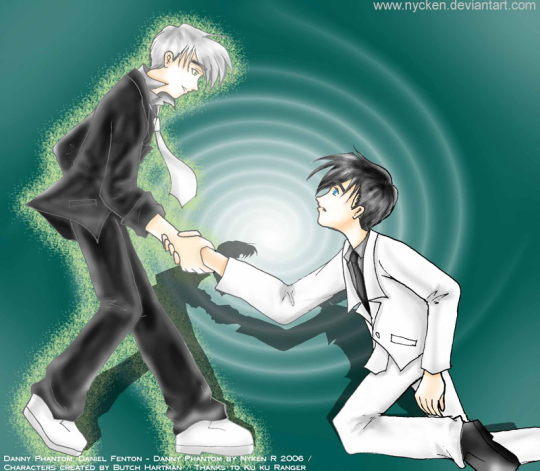
Save Our Soul by nycken isn't a shipping piece by any means, but it could very easily give rise to the idea, especially if someone is new to the fandom.
They did not shy away from it being a self-cest ship back then, though. The idea that Phantom wasn't Danny was there, but I don't think anyone looked for evidence in the show to support it. That seems to be something the ship has evolved into rather than something it started from, and it is honestly my favorite way to see it.
I do have many headcanons about how they aren’t the same person in canon if you're interested! There’s the out of sync transformations, the title sequence and how Super and Fun are shown to separate in the Identity Crisis episode, Vlad’s inability to clone Danny, the way Danny talks to himself, just all kinds of things! If you want to hear more about those I'd be happy to answer 😁 (they'd probably be easier too lol)
But yeah, I think it was TUE and fanart. There may have been other factors (I think this was around the time Yu-Gi-Oh and puzzleshipping was popular too) because fandom doesn't exist in a vacuum, but I really couldn't say for sure. It's a ship that means different things for everyone who ships it. I like the psychological questions when they start off as "one" (the bonded peeps version) and enjoy the aus like soooo much, but others like it only for aus, and others like it as a crack ship, and then there are even others who like it as something dangerous. Some people love it for Fun and Super in Identity Crisis because they're just fun caricatures. It's hard to find the origin point when it has so many branches lol
#Danny Phantom#Danny Fenton#pitch pearl#pitchpearl#I personally stumbled into shipping pitch pearl after reading too many reaction stories where Maddie finds out about Danny's secret#funny way to fall into a ship huh? lol#long post
83 notes
·
View notes
Photo

I read scripts for a living...... I don’t understand what on earth this ‘note’ is doing here, or why on earth Dabb would have written it.... something’s off...
I have NEVER SEEN ANYTHING LIKE THIS IN A SCRIPT. Mainly for this reason: EVERYTHING YOU PUT IN A SCRIPT DRAFT BEYOND A WRITER’S DEVELOPMENT DRAFT IS THERE FOR A REASON IN ORDER TO TELL THE CAST AND CREW HOW TO EXECUTE THE SCRIPT. And as a general rule, I have NEVER seen a writer’s note within a script. I know they happen on a RARE occurrence, but i can’t emphasise enough how rare they are. I have never seen them used in a previous SPN script. And they just aren’t used because YOU HAVE TO HANDLE NOTES LIKE THAT within the scene description, action, dialogue, or by using parenthesis or dashes or other screenwriting grammar-use tools. This pacing and tonal note of making sure ‘moments can breathe’ would and should be written into the fabric of every scene by any writer worth their salt. And that includes Andrew Dabb. And it’s not even like this is a complicated note to add within each scene? Essentially, this is an instruction on pacing which is dealt with within scene action and descriptions. I feel like these notes from the writer are used in films where the reader might not be able to understand what the viewer would see once the episode is made - so actors who play multiple roles, or if there is a seriously complicated concept to understand as a reader but less complicated to understand as a viewer - think trying to write Tenet. Anyway, my point is, that this up-top note we are to understand is written by Dabb. It’s a note from the writer to the cast and crew - so from Dabb. Why does he need to excuse the length of the script through a screenwriting Writers Note that IS BARELY USED and which I have NEVER seen him use before in an SPN script (although correct me if wrong). Who is Dabb telling this to? Why is it so important to put at the top of the script? Why, as a great writer (prior to 1520) can he not write this within the scenes themselves?
So who is the pre-teaser note for? Apparently this script is for the translators (which is why the name of it as ‘FINAL DRAFT’ is absolutely bizarre, but i suppose this is a translator thing? But if this note pre the teaser had been added before for the production crew, why would this need to be explained to them? EVERYTHING in a script (which is a working, technical document) is there to inform the cast and crew about how to technically execute the script. So why would this note be needed for the cast and crew? Surely the amount of pages and how the scenes are written are enough to tell everyone that the moments need to ‘breathe’? And regardless, making sure moments ‘breathe’ is down to Robert Singer - does Andrew Dabb need to write that direction cue to Singer and for everyone to see? No. He doesn’t.
So if this script draft is for translators, do they need this specific direction?
The script has revisions, therefore it’s a shooting script for the production crew so do the crew need this to be explained to them? But why? How will this really inform their work? Why are they even OWED this note? Or if this is for the translators if this was added post shooting - why do the translators need to know this? They’ll get the final cut and just do the dubbing/translations regardless of how long ‘moments breathe for’. The scenes will be taking in unhealthy gulps of air when they get to the translators who can’t exactly add more breathing space. They translate what they get - and can’t add more pauses so…?
I just don’t understand, why in a working script used to technically execute the production of an episode of television, ANYONE needs to be given this as a note? WHO IS THIS NOTE FOR?!
Which leads me onto my ONLY A THEORY theory. This note, which reads more like a reasoning or an excuse, and written as a Writer’s Note at the top of the script - something I have NEVER seen within the industry, was purposefully added to try and cover up the bizarre cuts and omissions within the script. This isn’t a technical note to Singer, and isn’t needed by the cast who will read the pages in the way directed by singer and by Dabb himself. The lighting or props or locations people can’t add more breathing space. Dabb and Singer will be watching over the Final Cut and make sure the astronomical amounts of oxygen and unnecessary montages and dead air are all in the final cut.
And regardless, this note speaks to the PACING of the script, and any good writer should never add a note to make sure everyone slows the pace of a script - the body of the script itself should pace the episode. And if we look at the scenes themselves, the moments ‘breathe’, or should we say - there is slow pacing created by pauses and ‘beats’ within the scene anyway. The ‘Note’ at the top is ALREADY written into the script, take for example this page:
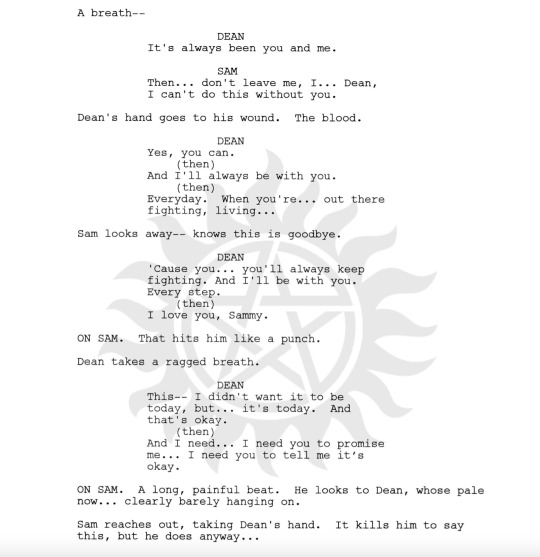
There is, clearly, multiple directions written into this scene to make sure that the pacing is slow, there are many pauses, and the ‘moment breathe’. In fact, there are NEVER MORE THAN FOUR WORDS before punctuation is added to make sure a pause occurs. Go through it for yourselves, any time you see: ‘--’ , ‘.’ , ‘...’ , ‘,’ , ‘(then)’ , ‘takes a breath’ , ‘a long, painful beat’ - any time you see any of those, or there is any action written, this is a pause. If there was any more oxygen and air to let this scene breathe, it would be doubled over with dizziness.
So, from a technical standpoint, this note up top is REDUNDANT and UNNECESSARY for a working, technical shooting script. And regardless, when Dabb wants to make scenes breathe, he has already written this into the fabric of those scenes. He writes pacing into his scenes well, so this note is pointless and certainly not useful to anyone from a technical standpoint. So why is it in there? And who is it intended for? Is Dabb trying to excuse the fuckery that went on with people messing with his script to the crew? Is this an addition from the Network who didn’t want crew or cast questioning why a finale episode is so short and there are so many additions? Is this added when the script was altered for the translators in case it got leaked (as it has done) and they needed a cover-up/excuse if fans see it?
Overall, the presence of such a bizarre note and my inability to work out why on earth Dabb would write something so redundant technically, and which sounds like a big excuse/false explanation of why this script is such a mess, makes me realise that either they’re covering their asses with fake excuses in case this got leaked, or the showrunners/network needed to add this to the script in order to explain wtf is going on to the crew or translators.
#sorry to get all conspiracy#i just have been thinking about that note since yesterday#and needed to get my thoughts out#im not saying anything#i just think its super weird#and my job is to make sure nothing redundant is in a script#and this is like the height of a redundant note#no professional writer would add this#and it just sounds like a full excuse#but to whom?#and is it really written by dabb?#seems like whoever wrote it is trying to cover their asses when people see the mess of the script#supernatural#spn#andrew dabb#15x20#supernatural finale#fuck the cw#fuck the finale
193 notes
·
View notes
Note
Can I ask what's wrong with Michael W Ford's books? I never read them but I've seen often people recommending them, so I'm curious. Thank you and have a nice day.
Thanks for the question! Sorry if this gets a little long, TL;DR is at the bottom but I've broken down some more specific examples in point form.
I'll preface this by saying that if people get something worthwhile from Michael W Ford's books, that's their business and I'm happy for them. However, there's a few things about his writing and him as a person that I don't really love and struggle to get behind. Most of the specific textual examples I give are from the Bible of the Adversary specifically, as it's one of his more famous books and the only one I personally have had the mental fortitude to page through so far.
- I'm immediately leery of anyone who's often described as a "visionary" or "luminary" on websites selling or listing their books, especially when I've gotten the feeling that it's just that his books are accessible and plentiful. Even among fans of authors like E. A. "Become A Living God" Koetting, the general opinion seems to be that his books lack a lot of consistency and are a bit poorly written. Can confirm for the Bible of the Adversary, at least. There's some parts of that thing that could have used a once-over by an editor.
- I try very hard not to use what happened to the Greater Church of Lucifer/GCoL against him. Another member of the community that I do still (loosely, infrequently) interact with was also involved, and while I sincerely wish they'd both more deeply researched the man they were signing up to run a very public and scrutinized church with, I think his turning into a scam artist who publicly converted to Christianity was enough punishment there. Likewise, I'm a bit uncomfortable with his past involvement with the Order of Nine Angels/ONA/O9A given the fact that they're a pack of murder advocating nazis, but apparently he left when he discovered that fact, so I try to give him the benefit of the doubt that he truly did distance himself from them immediately upon learning of their beliefs, as I don't know when these things became more widely known. However, both of these fumbles alongside how he presents himself and his books just don't sit well with me, as the most generous interpretation is that he was twice-misled in some pretty dangerous and harmful ways by those that are damaging to the public perception of Luciferianism, but still likes to be some figurehead of the Luciferian community. People make mistakes, and people can be misled, and people can learn from past experiences, but his track record is a bit upsetting for a supposed authority.
- His work includes pieces and ideas from occultists or practices that I tend to avoid in my own practice and study, such as Thelema and Crowley's writing as a whole, inspiration taken from the Temple of Set/Setian magic, Qlipoth (because it wouldn't be a Luciferian grimoire without pilfered Jewish mysticism), and forms of Gnosticism that embrace the idea of God as an evil demiurge (which i explained my discomfort with in my previous post). I'm also not a huge fan of his "all magic comes from within" approach (and find it hard to reconcile with his frequent use of Luciferian deities/spirits and demons), nor that he'll talk about Cain's role in "Luciferian grimoires" without actually naming any... though given how similar a piece of Lilith themed artwork he's done looks to Andrew Chumbley's illustration, I assume he means the sort of books the Cultus Sabbati was writing. I wish I still had the Ford version saved or could remember which of his books it's from, the side by side comparison is painful but without it I risk looking like I'm making things up.
- Heavy, heavy use of Lilith, which I don't love for reasons I outlined before. She mostly seems to appear whenever spooky lustful sex magick is being discussed, which is great, that's great.
- He also uses the Wiccan wheel of the year sprinkled in among his more Luciferian focused holy days, which is just really funny to me. Why are we celebrating Beltane, Michael? Why are we celebrating Imbolg? (Page 69)
- He likes to use a lot of "black magic" and "vampyre magic" stuff which tends to feel very sensationalized and over the top to me. I've seen discussions of vampiric magic I found very interesting, but so far his hasn't been one of them.
- He sometimes seems to conflate Lucifer with Samael which I really truly dislike, though it's admittedly not the most baffling or out of left field take I've seen.
- Ford at times seems to either willfully misrepresent or misunderstand information he's passing along. For example, in the Bible of the Adversary he says that Cain's name comes from "...root ‘Kanah’ which means to possess. This by itself presents the antinomian nature of his essence, while instead of sacrificing his most bountiful items to the Lord, he kept them for himself." As I understand it, discussion surrounding Cain's name possibly coming from the Hebrew word קנה (kana) lean more into it being the word for to get or to obtain, referencing Eve's declaration after his conception that she'd gotten a man from the Lord. I'm all for alternate interpretations, but it feels like needless edgy-fying to fit the narrative he's trying to present. (Quote from Page 58)
- He'll say some absolutely bonkers shit like "Abel in some Luciferian Lore is considered a lower pre-form of Cain, thus the sacrifice was not literal" with zero citations or references. Like sir what the fuck does that mean, what Lore, please give us the lore please. (Footnote, Page 59)
- His interpretation of the Watchers and the Book of Enoch is so insultingly bad that I won't even relay it here, but if I see one more person claim that an angel, demon, or spirit they want to distance from Christianity or Judaism is actually a Babylonian god I'm going to go feral.
- As I've hinted at above, it feels like he'll just cherry pick and regurgitate for no real purpose. A few spirits from other texts like the Lesser Key and the Grimoire Verum get mentioned for... mostly the set of names, it seems like, he just kind of lists them out of context.
TL;DR, Michael W Ford feels (to me at least) like someone who has picked out the more appealing and edgy occult trivia and magic he could find from a wide range of sources, recontextualized the parts that didn't appeal to him until they fit his aesthetic and purposes, and presented them as a workable entry point to the Luciferian religion and its potential magical systems that is all flash no substance... and then could barely polish the flash. I don't like that he's many people's first exposure to the concept of theistic Luciferianism, and I don't like how authoritatively he presents his jumbled works as what the religion is truly about when it's so broad a label. Again, if there is something that someone finds useful within his books I am very happy for them, but I have struggled to find anything I could point to that make them worth the read... even for me to investigate further keep critiquing.
I honestly do not know why so people recommend them, unless it's just that they're easy to buy, reasonably inexpensive, and specifically have the Luciferian label on them. If that's truly the case, those people are being lazy and uncritical in a way that doesn't speak well to their apparent Luciferian ideals.
47 notes
·
View notes
Note
hi! i promise i don’t mean to come across as rude, i’m just genuinely curious as to what you meant on that last mental health post where you said “Mental disorders are, in fact, social constructs. Just like gender and a bunch of other stuff, who knew...!”
are you saying that mental disorders are a made up thing by society? and if so, what do you make of ADHD, Bipolar Mania, and schizophrenia? i personally have the first two and my symptoms aren’t made up because i accepted societies ideas of Mania, there is an actual chemical imbalance in my brain.
if you’re talking about about actually putting names to illnesses, then i can definitely see where you’re coming from. medicine is evolving every day and obviously there will be advancements and changes to certain diagnoses, but it kind of rubs me the wrong way when you compare mental disorders to gender - which is definitely made up by society - because it implies that you mean that mental disorders are just something made up by a group of people and not something that is real and affects around 970 Million people (a rough estimate from the world health organization from 2022)
again, i really don’t mean to be rude so i hope it doesn’t come across that way!
I don't think this came off as rude anon, don't worry about it :3 I'll expand on this real quick
So, basically, yes the symptoms are real, the chemical imbalances in the brain are also real and measurable, as well as like physiological brain abnormalities, ect. The names, definitions and categories we use to describe them are, however, socially constructed.
An interesting example I just came up with to illustrate this would be to think about prehistoric cave people who had nearly identical brain structures to our own but have yet to organize themselves into complex social systems like we have in modern times. Imagine yourself being born in pre-historic times with the exact same brain structure and chemistry you have right now, you would experience the exact same set of symptoms but you wouldn't know to think of them as 'ADHD' or 'Bipolar mania', etc. because these concepts simply don't exist yet. To summerized, the types of experiences that society now considers to be mental disorders have been present in human populations as long as our species existed but their names and categorization are a relatively recent invention.
Now bringing this back to gender, which is a social construction that affects over 7.75 billion people around the world (rough estimate I just googled lol) Again, thinking about prehistoric cave people, they actually didn't have the concept of gender for a good long while. They, of course still exhibited the same broad range of primary and secondary sex characteristics all mammies do but the social roles of 'man' and 'woman' had to be socially constructed at some point during the evolution of human social order. My understanding is that those roles were necessary for early division of labor, as some configurations of the human body are better suited for certain kinds of labor than others and constructing those categories along the lines of sex characteristics was the most efficient way of doing it. In other words, gender used to be kind like a job - a thing that you are because of the things that you do (A plumber is a plumber because he does plumbing, a man is a man because he does man tasks)
So the same way the genders were socially constructed to meet society's need to organize labor more efficiently, the various categories of mental disorders were constructed to meet society's need to take the individuals who experience various kinds of mental distress and better integrate them into the social order.
I feel like many people treat the term 'social construct' as some sort of value judgement, as it it's synonymous with 'fake' but it's really a value-neutral term that is used to describe stuff that doesn't exist outside the context of human society. Every single social construction was invented at a certain stage of social evolution for a reason, it solved some kind of problem and served some kind of purpose for the particular subset of people at a particular time who invented and shaped it. But the main purpose of identifying various social phenomena as socially constructed is to help think of society as something evolving and malleable, as something that is made up of various elements that can be either kept the same, reformed or retired entirely in some cases. In other words, every social construct serves a purpose but it doesn't mean it serves it prefectly and without creating more problems in the process.
TL;DR genders and mental disorders - malleable socially constructed categories. Human sexual dimorphism and individual experiences of mentally ill people - measurable and real.
#clusterasks#clustered thoughts#society#This became a whole thing huh?#Yeah I wasn't planning to write an essay today and yet I did#oh well I hope someone out there finds this helpful#Please reblog this I spent like an hour formulating my thoughts into something coherent and readable#Tune in next week for part 2 where I spend 10000 words explaining the even hotter take which is:#'Anything and Everting Is A Social Construction'#okay byeeee#yo momma so fake she's social construct#OOOHHHHHHHH#okay bye for real now
2 notes
·
View notes
Note
plum drop the essay on fuyu/peko and mondo/taka paralelles !!!! i am curious
ask and u shall recieve (inserting my first ever page break because holy FUCK this got long)
oke! I guess I’ll start off with Peko’s initial conception as a character, which was the main initial comparison danganronpa intended between Peko and Kiyotaka.
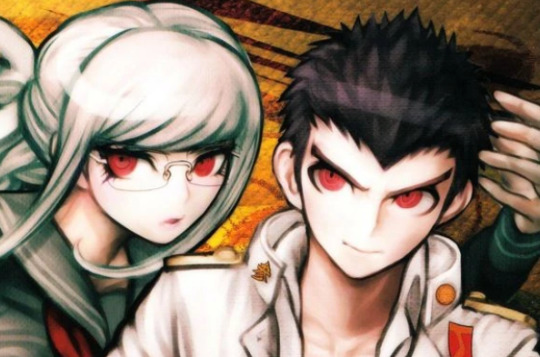
I’ve noticed danganronpa has a tendency to re-use character tropes or roles after each game, tho their fates end up differently. For example, Chihiro was the smart, cute, and sweet character who ended up dying early on and had little significance outside of alter ego afterwards. Chiaki is the same, except if Danganronpa took Chihiro’s character and made her one of the main protagonists that has much more significance in the game.
The staff of SDR2 confirmed that they based Peko off of Kiyotaka, from their intense red eyes (which was intentional) + predominately b&w colorscheme, they both have swords, and their characters are tied to justice, though in different ways. Not to mention both are meant to be extremely disciplined, but ultimately struggle at socializing due to their rough backstories. But that’s where Peko’s ties to Taka as an initial concept end there, because the parallels between Peko/Taka and Fuyuhiko/Mondo are a whole ‘nother ballpark.
Before bringing that up though, we should note that while their designs are significantly different, Mondo and Fuyuhiko are extremely similar in terms of their backstory and personality (down to their ability to curse like a sailor). Both struggle with an inferiority complex (Fuyuhiko w/ how he isn’t taken seriously because of his babyface, Mondo w/ how his self esteem is really fragile and gets jealous of others when he acknowledges them to be stronger than him). Both act like tough, aggressive lone-wolfs (well, Mondo pre-sauna anyways), but have been stated to have a soft side, to the point they doubt their capabilities of being a tough leader because of it. They both even have a sibling they both believe would be a better leader than them (Daiya and Natsumi). BASICALLY fuyuhiko and mondo are the same role, being the intimidating gang leader that no one should fuck with, but in actuality has a lot of insecurities behind that facade.
Ok, ok, time to the ACTUAL relationship parallel analysis. We now know why Peko/Taka are meant to be parallels, and we can definintely make a solid claim for Fuyuhiko and Mondo. This isn’t new for Danganronpa, in their tendency to use patterns but give them a different twist depending on the game. Which is exactly what happened in regards to chapter 2 of THH and SDR2, respectively.
The games’ chapter 1s are simple: meant to introduce the characters/game/stakes. Leon and Sayaka’s deaths were tragic, but the emotional impact of them wasn’t the main priority by the writers. Only to show that this was, indeed, a Killing Game where anyone’s possible to die. But chapter 2 of danganronpa is intended to be the chapter where you’re introduced to just how emotional and tragic the games can actually be, meant for maximum heartbreak (for both the characters and the player).
Chapter 2 of THH was where the different students’s relationships between each other became more solid. Sakura and Aoi were good friends. Toko’s obsession for Byakuya first solidified. Hifumi being Celeste’s servant, etc. Taka and Mondo’s fast developed friendship is no different. After the sauna, the two clicked so much that they believed calling each other just a friend wasn’t really accurate, and settled on calling each other brother instead. While they don’t have memories of their close friendship during Hope’s Peak at this time, it’s heavily implied that their closeness during that time made them subconsciously gravitate towards each other so fast, which could also be seen with Sakura and Aoi, and how Chihiro was able to find Makoto familiar during their introduction.
Peko and Fuyuhiko’s relationship could be considered to be just as close. The two grew up together, quite literally since they were kids. Like Taka and Mondo’s relationship pre-sauna, Fuyuhiko and Peko’s relationship was somewhat strained, though it’s more deeply rooted than two extremely contrasting guys clashing over their perceptions of each other. Fuyuhiko is extremely insecure in his place as the Kuzuruyuu clan’s head, and sees Peko’s desire to protect him and carry out his commands as an unwanted crutch that challenges his desire to be independent, as well as extremely worrying considering how because of this, Peko devalues her own life and worth as a person. Fuyuhiko very much loves Peko as a person, and as such tried to distance himself from her during their time on Jabberwock Island. Though unfortunately, Peko took this as him loathing her in general, further cementing her desire to be his “tool” because if he couldn’t stand being around her, she might as well make herself useful to him.
Now. Finally to get into the explicit parallels between the relationships of Kiyotaka/Mondo, and Peko/Fuyuhiko. Peko and Taka’s perspective on their relationships is a great starting point.
Each game’s chapter 2 shows just how willing both Taka and Peko are willing to go in order to protect Mondo and Fuyuhiko. Peko’s motive for killing Mahiru wasn’t to escape, but to in her eyes save Fuyuhiko from the Killing Game, by using herself as his tool to carry out muder, and have everyone incorrectly vote for her so Fuyuhiko could get away. She was his bodyguard in the truest sense of the word. Now in THH’s chapter 2, instead of fighting against Mondo in proving his guilt, you’re fighting Kiyotaka. He refuses any evidence you throw at him, arguing relentlessly to prove Mondo’s innocence, to the point the only reason he stopped was because Mondo told him to. And you later find out, in chapter 3, that Kiyotaka felt so determined to prove Mondo’s innocence was because he felt like it was his responsibility to, as he cared for Mondo so much.


So, in a way, Taka considers himself Mondo’s bodyguard. Just without the years worth of reinforcement that you’re nothing but a tool to be used which makes you devalue your own worth as a person. (Not that his self esteem and willpower wasn’t ultimately crushed by Mondo’s execution, but that’s only because the circumstances he lost him was undenyingly brutal considering the Killing Game). While the circumstances of Peko’s desire to protect Fuyuhiko are really murky and problematic considering how she was raised, Danganronpa confirmed that she protected him so much because of her care for him, to the point she was willing to sacrifice her own life to assure that Fuyuhiko is safe. And Kiyotaka was willing to go to the exact same drastic measures, by voting for himself.
It’s also worth noting that in the stage play, he willingly accepted to be punished alongside him by doing this to make sure Mondo doesn’t die alone.
So from my own understanding, Super Danganronpa 2 took the tragedy of Mondo and Taka’s relationship, and flipped it so that while it still follows its signature use of repetitive patterns, they made the circumstances different, but just as heartbreaking. And how? Because they took the Taka of the relationship, and made Peko the culprit. It’s not the Mondo this time, which is who you’re supposed to expect to be the culprit, because of your expectation from THH’s trial 2.
Peko tried her best to protect Fuyuhiko, much like Kiyotaka tried to after he recognized the fact Mondo was the blackened. Both were, at the expense of their classmate’s and their own lives, were willing to protect them both, no matter what. Peko took a more active role in trying to do this however, which is what Kiyotaka severely regretted not doing, as stated in chapter 3.
And Fuyuhiko is what would have happened if Mondo was forced to face the consequences of his actions (in Fuyu’s case, being partially responsible for Mahiru’s death, in Mondo’s case, Chihiro’s). Instead of Taka arguing to prove Mondo’s innocence, it’s Fuyuhiko who’s doing that for Peko. A deliberate use of subverting the pattern given to us by THH’s chapter 2.
That’s the main takeaway, but I suppose I should also address the romantic parallels while I’m at it. I personally don’t like Kuzupeko as a romantic relationship, mainly because of how Peko’s self worth and personal value of herself as a person was as a direct result from being considered Fuyuhiko’s “tool” and their professional relationship as yakuza leader/henchman. Fuyuhiko does love her as a person, but that doesn’t negate the years of psychological degradation Peko endured to consider herself as a tool. Though in typical Danganronpa fashion, they choose to gloss over the problematic aspects of their relationship while heavily implying romantic subtext between them. So while I can’t say I’m a fan, I know the game/DR3 anime says otherwise.
And as for Ishimondo, I know some will disagree with me, but I definitely feel that their relationship is heavily lined with romantic subtext as well. Not much is really explicit in the game outside of Ishida and Hifumi’s romantic rivalry for alter ego (who Taka considers Mondo), but the mangas and posters definitely show their relationship that most would consider normal for couples.
But at the end of the day? Both Peko and Taka love Fuyuhiko and Mondo, whether or not you consider both, one, or none of their relationship to be romantic. They wouldn’t have put their own lives on the line if it was anything else. And it’s that emotional connection between Kiyotaka and Mondo, and Peko and Fuyuhiko that’s meant to give you an emotional punch in the gut for THH and SDR2’S chapter 2’s, because of how far the two were willing to protect them.
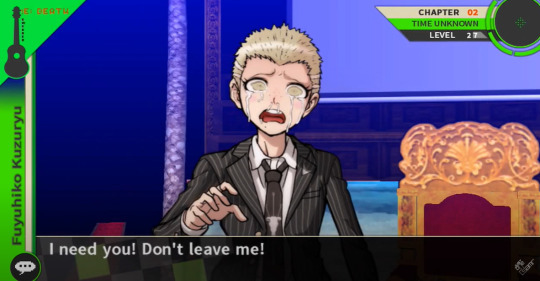
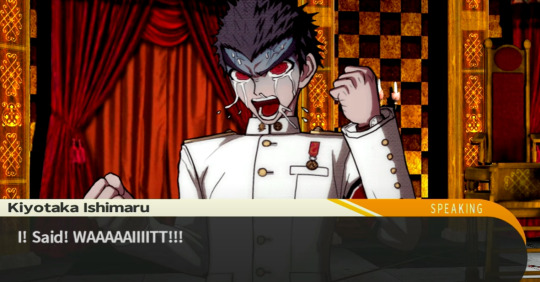
#ask#spaceymedicgamer#kiyotaka ishimaru#peko pekoyama#cw kuzupeko#ishimondo#danganronpa#super danganronpa 2#DanganRonpa: Trigger Happy Havoc
434 notes
·
View notes
Text
warning: this post is just me ranting about the writing of the naruto women for far too long
i honestly feel that one of the most frustrating/vaguely hilarious aspects of naruto is how naruto ended up being - and bear with me here - the best example of the extremely specific female archtype that kishimoto seemed to be obsessed with.
like when you focus on sakura and hinata - arguably the most important female characters in the show as the two male leads’ respective end game love interests - you can break them both down into the same general mold:
- both devoted to the same boy their entire lives
- both are shown chasing after their crush in order to stand on “equal” footing (i.e. sakura’s “i finally caught up to them” and hinata’s “no longer chasing but standing by your side” mentalities)
- both suffer and try to overcome feelings of inferiority in their respective character arcs
and i want to be clear that while female characters who fit this mold aren’t usually my favorite thing it can definitely still work when written carefully and written well - to be blunt i personally think both hinata and sakura are awesome character concepts and both had SO MUCH potential and i love their fanon interpretations but i feel that canonically they were poorly written, underdeveloped, and flat characters
most of their canonical character motivations revolve around their love interests - which really sucks because i would have KILLED for a deeper look at everything involving hinata and the hyuuga or even more about sakura’s development of her medical ninjustsu so much got skipped when it came to them which definitely didn’t help anything - that aside this is especially true in og naruto though to be fair - sasuke was still in konoha in og naruto and team seven was together for most episodes which made it especially prevalent in sakura’s case
the point is by the time shippuden came around it was extremely obvious that efforts were being made to improve the female characters - sakura now had much higher combat ability from the start of shippuden and, though she gets much less focus hinata is repeatedly shown doing brave acts and pushing herself to become stronger. and while i really loved the effort and it was definitely an improvement from especially sakura’s original character - it still fell flat to me.
sakura’s fight with sasori was perfect and a great way to revive her character but then she was pretty stagnant in a lot of the following arcs - i.e. injured in the reunion arc, not very important during the two saviors arc, her weird fake love confession during the assembly of the five kage arc, etc. - she constantly bounces between “now i’m strong” and “i still don’t measure up” making her character development - especially pre-war - virtually nonexistent because every step forward gets followed by a step back.
hinata is a bit more difficult simply because she’s such a minor character for so much of shippuden which is insane since she’s literally the protagonist’s future wife. regardless, looking at hinata’s big moments: her fight with neji in og naruto, blocking naruto from pain in shippuden, and the Smack during the war (there’s a few i’m missing i’m sure but those are really what constitutes her biggest moments to me during the meat of shippuden’s actual development phase - not the post war resolution phase) two of three of these moments precede her getting very heavily and soundly beaten which personally irks me - even if i don’t particularly like it i can see why and it makes sense to me she didn’t win the fight with neji or her pain confrontation and it definitely shows that she is brave and emphasizes the all-important devotion to her love interest aspect of her character BUT it’s also a little obnoxious that we never get to see her be REALLY victorious in her major moments.
so to sum up so far: sakura and hinata are both meant to be perceived as innovative and strong female characters but this perception doesn’t work in sakura’s case because she immediately repeatedly reverts back to the damsel in distress archtype and it doesn’t work in hinata’s case because the few strong moments she has are highlighted by failure.
and also the all important point that the majority of their “strong moments” are driven by their love interests - not a bad motivation except for the fact that that is one of their ONLY motivations
to the main point i’m trying to make: lets compare naruto (obviously take this with the understanding that naruto has a MAJOR advantage of having way more screen time and development as the titular character)
in regards to sasuke, naruto:
- is extremely devoted
- repeatedly chases after sasuke to match-up with him and improve
- and, especially in og, struggles with feeling inferior to sasuke
the context is a little different and the motivation behind some of the points changes between the two but it’s the exact same mold as sakura and hinata
the major difference between the two and the main reason that so many more people get frustrated with sakura’s devotion to sasuke and not naruto’s really boils down to development
sakura barely had her own character outside of loving sasuke and when she did, it immediately got downplayed in some way - just look at the war arc and her triumphant “i finally caught up to them” right before both sasuke and naruto essentially gain godlike powers, she then spends the war constantly distracted by sasuke even when fighting “sasuke isn’t worried about me at all” which really downplays her role.
on the flip side, even with his main goal of bringing sasuke back to the village, naruto has tons of motivation and character building outside of sasuke - ex. becoming hokage, gaining everyone’s acceptance, fixing konoha, living up to his parents/jiraiya’s expectations, bringing peace, protecting everyone he can, freeing the tailed beasts, etc. etc. you could go on forever the show is named after him after all.
we are told that sakura always chooses sasuke and nothing else about it but then we are told that naruto chooses sasuke despite everything else.
to sum up: the traditional female love interest that kishimoto wants to invent is the woman who is devoted. she puts the person she loves above everything else because she loves him. she’d do anything for that person even if it puts her at risk, etc. but at the end of the day there’s still the tired trait of still relying on the man in her life for certain things. and he doesn’t bother to expand characters like sakura and hinata beyond that. (great examples of characters who are almost completely separate from this mold are tsunade and temari - though one might argue about the way they were written designed to fit specific tropes for comedic moments - personally i think they manage to dodge that for the most part though)
with naruto and sasuke - naruto manages to fulfill every roll sakura is meant to in a much more elaborated and better way all without the curse of the female love interest that sakura and hinata bear. it’s hard to accept sakura and hinata’s “i’ll love you no matter what” when naruto is already actively outright doing that with sasuke. the roots of sakura’s feelings for sasuke, hinata’s feelings for naruto, and naruto’s feelings for sasuke are all exceptionally similar to one another which is what shoots kishimoto’s main romances in the foot - because it’s hard for them to measure up to the main “platonic brotherly” relationship he built between sasuke and naruto.
this post is obviously disregarding a lot of the Other really deep parts of sasuke and naruto’s relationship and some important points about the other women of naruto. also it’s important to think on the time period naruto and naruto shippuden were written in. we’re in a major incline period for improvement in how women are presented in fiction - just look at the difference of women between og and shippuden. obviously it doesn’t completely excuse anything but it’s a point to consider.
sorry for the rant and sorry if this is all really obvious to you or if it’s worded poorly, kinda just needed to word vomit my thoughts. i really like analyzing how women are represented in fiction and how the representations have developed over the years. i wrote a few essays about it for some of my courses and now i think about it all the time. obviously i’m not claiming this is how everyone should view these characters or anything i just had lots of my own thoughts about the entire situation and dynamics that i had to put SOMEWHERE. if you have any thoughts about it or points you wanna bring up feel free to do so i love fiction analysis a lot so i love hearing other people’s opinions
#naruto#naruto shippuden#naruto analysis#20 years old and doing naruto analysis in my spare time rip#long post#pls ignore my messy thought process i haven't been sleeping super well so i'm not sure about the clarity on this one tbh#also sorry i know this isn't like my usual posts was just in a Mood#if any of you like my awful takes let me know because i have tons of them i just never post any because the posts end up stupid long like so#anyone who read the whole thing im sorry are u okay?#my posts#also i know sometimes these posts can bother some people so let me know if i need to add any tags to help with that! i gladly will
41 notes
·
View notes
Note
Hi darling, Idk if you talked about this before, but what do you think about Rumeysa (Mustafa's concubine)? Do you think they planned to make her Mustafa's wife untill the actress was changed? And also, if she would've become his wife, how do you think she'd act in comparison to how Mihrunnisa (queen) acted? We didn't really see a lot of her but I wanted to know what do you believe they wanted to do with her character
Hey, dear! 🤗 No, I haven't talked about Rumeysa in here. I'll cover the S03 one and the S04 one separately, because in practice, they're both very different characters.
I strongly dislike S03 Rumeysa as a character, to be brutally honest. She goes all good, nice and innocent, when secretly she's sneaky and even manipulative in order to fulfill her goals. The thing that annoys me the most is not necessarily her fixation on Mustafa and how she wants to get him, because after all, it's a harem and everyone wants to get him, but how nearly inexplicable her whole motivation is, in spite and outside of that.
I feel Rumeysa's arc could be split in two almost separate halves - her set-up in the harem (pre-E93) and her as a favorite in the harem. (post-E93). The most interesting things about her were precisely her set-up and backstory. The way she was sent to the harem, the way she was tied to signora Gabriella, the way both of them were about to reunite and when that happened, Rumeysa was just confused more than anything... The idea of sisters finding each other within these harem walls was fascinating, but that was seemingly dropped. I feel even from this point on that the show tried to make a case of a person who's been long in the harem and has lost the touch of a free life to the point of being afraid to leave, but her confusion on the signora and her refusal to go with her was the only part they pulled off. (not to mention they executed that concept much better with Sümbül!) Then begins the second half of her arc that went in another direction the writers didn't succeed to make me get. I didn't get why she wanted Mustafa so much. She said she wanted and appreciated Mustafa a lot and that was why she wanted to leave and this trainwreck began all of a sudden! That doesn't make any sense! She had no (or at least not pivotal) scenes with Mustafa before E93, she neither experienced a desire to get Mustafa, nor was it shown to the audience in any way before the convenient moment. Her build-up was never about Mustafa before then. Her arc was never about Mustafa before then. And yet Mustafa became the center of her character, to the point it's as if they were like: "let's have another woman for Mustafa, but this time with an even more overexaggerated you might think it was Turhan Hürrem-esque arc, so we can make her his full on woman!". She was paving her way through sneaky methods to the point of hypocrisy for no reason, she didn't even have much of a threat, either. Ayşe Hatun put pressure on her once in a while, but it felt understandable when she had a child from Mustafa and that, Rumeysa started acting this confident just like that. I get that in the harem you have to be sorta like that in order to survive, etc., but with Rumeysa that wasn't enough of a motivation! She seemed just fine under Mahidevran and taking care of Nergisşah before then, she could calm people down, what happened? And notice how in the second part of her arc these scenes were lowered to the minimum, or recontextualized, at the very least, so you can't buy anything with her anymore.
But wait, what if she always wanted Mustafa when she arrived? Then every moment of kindness she has shown, even to the little child, becomes even worse in retrospect, because it would either just suit her interest, either become a jarring contrast with what she has shaped up to be. But wait actually, that effect is achieved even without her arc being split in two halves! I would've sympathized with her much more if there was some additional motivation, like everyone else basically, but honestly, the harem excuse is all we could use with her and in her case, that just doesn't suffice, especially for such a big shift in storylines. And then after building up to a halvet, we had the halvet and it was over and left me very unsatisfied. (okay, that's probably because of the actress, but still)
She was screwed up spectacularly at best and downright horrible at worst. Her early concept was way too good to be left out like that and since that leaving out was maybe inevitable for the writers, they had to do this transition better and have the first half of the arc be focused on Rumeysa, as well as Gabriella, instead of making this whole line with her being Gabriella's sister she was searching for more of a plot twist than an organic build-up, because Gabi was the one click baited to want Mustafa! This character ended up being defined by her goal she was trying to fulfill and nothing else, not any redeeming quality whatsoever.
I think Rumeysa was the least suited woman for Mustafa, yes, even less than Fatma. Because if Fatma had some love for him and was genuinely trying to calm him down after Efsun at first, with Rumeysa we simply had steps to get him right from the start and an entire ordeal that wouldn't sit well with Mustafa. We didn't even know not only why she wanted Mustafa, but also what was it she had with Mustafa - was it love, was he just a vessel for her to rise in the hierarchy (that's probably it for me), what was next when he was all hers etc. We have no feelings, no insight here and Mustafa himself was only slightly intrigued at best. And even if she were there for the battle of the throne, she would definetly scheme even more actively than anyone else and that would seriously clash with Mustafa's desires. I don't think she would suit S03B Mustafa's level of maturity, either.
Yes, I would say S03 Rumeysa could very well be the endgame for Mustafa and become his wife if it wasn't for the actress leaving and stuff, because of how she was framed to succeed. This part of Rumeysa's arc existed in a vacuum, it was a tiny victory after a tiny victory due to sly thinking that she was always allowed to get away with somehow. Again, the way she was slowly, but surely getting her way reminded me of all the Hürrem-esque arcs in the series that did end up with these women becoming the total favourites and I wouldn't be surprised at the least if they kept that pattern of success with Rumeysa, since it was very present in her arc.
[While we're at it, I didn't get why Mahidevran believed her so much. On one hand, yes, character development, because, as seen with Mihrünnisa later, as well, Mahidevran no longer gets suspicious of the nature of these women and only intervenes when she sees a decision of Mustafa's regarding them that could potentially be dangerous for his future, coupled with the fact that Mahidevran values loyalty a lot and she has seen nothing but that with Rumeysa. But on the other hand... Mahi is usually so perceptive when it comes to women that could actually be problematic or dangerous for him and Rumeysa being the only exception then was as much character development and the chance of lowering her guard because of the calmer environment as it was.. way too convenient, since we saw Rumeysa was playing a game behind the curtain. Especially the situation when Rumeysa provoked Ayşe Hatun on purpose for Mahi and Musti to see and Mahi not listening to Ayşe or Fidan's warnings about Rumeysa, along with her fully adapting to the harem laws she was previously against and taking on her role as a Valide in Mustafa's harem, was almost like Plot Armor for Rumi similarly to how Hürrem acted accordingly when she saw SS listening to her in the candle mirror in E44, albeit in the opposite way. I view that as a clear recipe for narrative favor and I was appalled that it had to be with such a character.]
If S03 Rumeysa became his wife, I don't see her acting much like Mihrunnisa. First off, due to how her arc was framed, Ayşe Hatun would have very much stayed as an antagonist of hers (even though Rumi wouldn't view her as one in their confrontations) and would try to eliminate her in a secret, subtle and cunning way. While Rumeysa would definetly try her all to keep Mustafa safe and would try to win Mahidevran's support for the marriage the way Mihrunnisa did, Rumi would have more of an agenda of her own she would follow. I won't be surprised if she tried head down on the path to overpower them all in her influence of him, either. Mustafa and Mihrunnisa were partners more than anything, with the same ideals, aspirations and desires. They were very close in their way of thinking and how they would approach problems, that's why they had such a deep bond. S03 Rumeysa would get further and further away from Mustafa's personality as his wife and if the other S04 events are canon, she would probably indeed go and reveal Bayezid's marriage with Huricihan the moment Mustafa refused to and act herself instead.
S04 Rumeysa is barely there, but I like her a bit better. She is an entirely different character with her consistent worries for the future, her more caring and protecting nature and even Mahidevran's more "I'm fed up with all this" attitude to her. Even if we add S03 Rumeysa to the mix, we get at least more feeling out of her and what was she all about and we get some other contrasting facets of hers as a bonus: in contrast to Rumi calming Mahidevran down when Mustafa disobeyed SS's order in E91/2 (my favourite S03 Rumeysa scene, but it was also kinda ruined post-E93), now Mahidevran tells her not to worry so much. Thing is, S04 Rumeysa could very well work without S03 Rumeysa both because of the different actress and the different characterization that could only loosely recontextualize S03 Rumeysa at best, and since there was a time skip, some random concubine and favourite Mustafa slept with and she became pregnant wouldn't be out of the question at all. Yes, her death would probably have less impact that way, but nor could I ever bother with S03 Rumeysa, nor would it be weird because of her different dynamics, which made her look almost foreign in comparison. (that's not on the actress, both Rumeysas were great!) And it would be as impactful as it would've been for Mustafa and Mahidevran, because the loss of the child would be just as devastating for him and was still tied to the mirror of sin.
If S04 Rumeysa didn't die and became Mustafa's wife, I think their bond would be focused more on their future child than anything. Rumeysa would probably act similarly to S03 Ayşe Hatun, only in a more secure position, I see a lot of similarities there. I don't think their bond would be as deep, but they could have the chance to get close for a little bit. I see Rumeysa refraining from acting so much, because of her worrying for the consequences, but when that fear gets the best of her, she could take desperate measures.
#magnificent century#muhteşem yüzyıl#muhtesem yuzyil#rumeysa hatun#ask#queen-deter#that's basically why S03 Rumeysa annoys me so much#actually strongly disliking her is an understatement#i may overexagerrate but she indeed is one of my least favourite characters in the show#the interesting thing is that Firuze had similar problems with her ambiguity#but not only is she an antagonist rather than one we're supposed to root for in narrative#we see her helping nature outside of her plan which helps us buy it much more and actually be a more functional contrast#unlike rumeysa#and while she was written in two halves as well i'll probably call them pre-plan of twist and post-plan of twist#the build up was slower and more detailed since it was framed as a mistery we weren't supposed to buy#so her motivations were more interesting to decipher#and she had a personality outside of the schemes that could work outside of the planning issues#rumi is more like Turhan in comparison#a much softer version ofc but still
20 notes
·
View notes
Note
um not to start anything “zuko had everything handed to him by the end of the show even though it took him until nearly the very end to realize he’s wrong: a country, a crown, his girlfriend that HE left behind, the love of his uncle that zuko spent most of the show yelling at and being a dick to, and that’s why he just doesn’t deserve ANYWAY I’M JOKING but this is how y’all be talking about aang” who even talks about aang this why????
It sounds to me like some Aang stans grossly misunderstand criticisms surrounding the writing of Aang’s arc in book 3, in particular during the finale.
This is actually a pattern I’ve noticed with distressing frequency, particularly of late: any criticism of Aang at all--of his actions, the narrative scaffolding surrounding them (never having to apologize for kissing Katara without her consent, for example), or of the failings in the way his narrative was handled (in book 3 especially)--is written off as hate and derided by stans who I can only assume believe that the writing of his character arc was perfect and he never did anything wrong that deserves fair criticism ever in his life.
To this, I can only state my firm disagreement.
The thing is, they don’t really have any counter arguments to refute the points that actually get made (which isn’t to say there aren’t bad faith criticisms of his character just like everyone else, but unlike most of the cast, ppl seem far more inclined to act like there are no valid criticisms of his character or his writing), which is likely why they just write it all off as unfounded hatred of their precious bean fave and ignore it accordingly. But that doesn’t, like, make the issues with his writing, or with book 3 as a whole, go away, and the fact that they refuse to engage with good faith criticism (and, in fact, often refuse to engage with criticism at all by pretending there’s no foundation for any of it--I’ve actually seen people try to justify Aang’s actions in, for example, Bato of the Water Tribe by insisting that Sokka and Katara were actually worse and that Aang lying to them shouldn’t be held against him because they were Mean About It which.... yeah I could go off for days about that alone) says more about their lack of actual engagement with the text of the show than it does about the people who are criticizing his character.
The things that we say were handed to Aang--the deus ex lionturtle (which gave him energybending), the Rock of Destiny (aka the thing that gave him back the Avatar State without having to even attempt to do the work to unblock his chakras again himself), and Katara, presented to him as the prize he’d won at the very end of the show--are things that he did not do the work to actually earn.
Which will probably get some peoples’ backs up, so let me rephrase--the narrative did not put in the work to show how he actually earned these things, preferring to waste time with pointless filler in the front half of the season and then only bring up problems and then solve them within the four episode finale because they left no more room for these very plot critical points earlier in the show. Take Aang’s unwillingness to kill Ozai, for example--this is something that absolutely should have come up far earlier in the season (prior to the invasion at least), and the fact that it didn’t says two things: one, that because the writers knew Aang wasn’t actually going to face Ozai during the eclipse, they didn’t think it mattered to follow through on what Aang planned to do if the invasion had been successful; and two, his sudden clinging to his people’s pacifism seems directly at odds with where the entire narrative of the show had been headed to that point. Why is he suddenly insisting he’s the consummate pacifist when we’ve seen evidence in the show of not only Aang reacting in violence and vengeance (towards the sandbenders, and that wasp he killed), but also evidence that Air Nomads were not the sort of pacifists who would roll over and just let someone commit genocide (the fire nation corpses surrounding Monk Gyatso, clear evidence [which Aang never seems to so much as consider at any point during the series, despite the fact that it could have been a point of much-needed growth and maturation, or at least examining his own people’s beliefs and realizing that, at twelve, he had a flawed and incomplete understanding of his own culture] that even Aang’s mentor was willing to kill in order to protect his home and his people)? Why, if he’s so damn pacifistic, did he never seem to consider with guilt any of the lives he took while in the Avatar state and fused with the Ocean Spirit?
And no, by the way, I’m not saying he’s to blame for the deaths Koizilla caused, but I am saying that it doesn’t make sense that he feels no remorse over all of that blood. Particularly since we see that he considers actions taken while in the Avatar State to be his own--he feels guilty when he goes into the AS and scares his friends, and he very specifically removes himself from the AS to avoid killing Ozai, which tells me that he does consider the AS’ actions to be his own. And if all life is sacred to him to the point where he won’t even eat meat (although Air Nomad vegetarianism makes no sense, but that’s another rant entirely) why doesn’t he so much as mourn for the lives lost during the attack?
These are all questions which the narrative itself never considered, and it’s frustrating because many of them are questions which should have been asked--and answered, or at least attempted--in the course of the final act of Aang’s character arc. He had a great set up going into the third book, with Monk Gyatso’s teachings filling in some of the blanks in Aang’s (again, flawed and incomplete--I challenge anyone to try telling me that if they were completely removed from their culture at age twelve, and it was subsequently wiped completely from the face of the earth, that they’d have anything close to a deep and nuanced understanding of it; twelve-year-olds don’t have a deep and nuanced understanding of anything, nevermind an entire culture and worldview, which is why Aang kept parroting soundbytes from the monks without actually understanding them) understanding of Air Nomad beliefs, but this thread was completely dropped in favor of... I’m still not sure, honestly.
Was Aang running away from his problems and effectively lying to his friends (does he ever actually come clean about being completely unable to access the Avatar State of his own volition?) more important than going back to the Guru, or at least his teachings, and coming to understand his own culture? Where was his arc of regaining the Avatar State because he worked for it, because he tried to re-open his chakras and, for example, came to understand what letting go of his attachment to Katara really means? (That’s actually one of the most frustrating bits, because a) he gets to have his possessive and unhealthy attachment to Katara and get the Avatar State back, despite paying lipservice to letting her go at the end of book 2; and b) he never seems to get what ‘attachment’ the Guru was actually referring to--letting go of Katara doesn’t mean he had to stop caring about or even loving her, but it does mean he was supposed to give up his selfish and possessive attachment to her, which means no nodding when some actor in a play calls fake!Katara ‘the Avatar’s girl’ and no assuming they were supposed to be in a romantic relationship despite never actually asking about her feelings and no kissing her without her consent just because he wanted her to feel the same way about him and didn’t care whether or not she actually did [otherwise he would have asked, and he never once even tried].)
Instead, rather than having a season-long arc of re-navigating his chakras, opening them, and regaining the Avatar State under his own power, he gets thrown against a well-placed rock which does all the work for him at the very last second. Energybending, which wasn’t even thought of as a possibility earlier in the season, rather than being a concept he comes to discover on his own as he navigates his chakras for a second time and comes to understand the how the energy flows between each one, is likewise just given to him by a third party, with no work necessary on his part. And as for Katara, well, I’ve ranted at length about that in the past, but their last one-on-one interaction before the epilogue is when Aang kisses her without her consent, and she gets pissed off about it and storms off. There is nothing to bridge the gap between that and make-out city, nothing at any point indicating Katara’s feelings (because, as far as Kataang was concerned, her feelings never mattered) and how they were changing, no apology from Aang for violating her boundaries, no understanding of what he did wrong and why it was wrong. Nothing. Not a single conversation.
That is why we say that Katara was handed to him like a trophy. Because she was. Kataang was endgame not because it made any sense for Katara, but because Aang was the hero, and he saved the day, and he deserved to get his forever girl on top of it. There was never any real attempt to broach Katara’s feelings on the matter--she’s never shown reflecting on their pre-invasion kiss (in fact, by all appearances she completely forgot it even happened), and she is never once asked what her feelings are, not by Aang or the narrative--because, at the end of the day, they didn’t matter. Aang was getting the girl he wanted, and that was that.
We say that Aang was handed these things without working for them because the entire narrative of book three seemed particularly engineered to making sure he didn’t have to. Zuko, meanwhile, had to work for everything he achieved--the gaang’s trust, Katara’s in particular, his crown and his kingdom. (No, he didn’t particularly work to get Mai back, but that’s a whole other discussion, and he would’ve been much better off if she never showed up again after TBR.) He didn’t get to take any shortcuts. Aang’s arc is all shortcuts, at least in book 3, and that’s when they attempted to show how he got from point a to point b at all.
Anyway, the situations couldn’t possibly be any more different, and idk who said that but whomever it is clearly does not understand where the criticisms about Aang and his hamstringed book 3 arc are coming from.
228 notes
·
View notes
Text
pre-new 52 scarebat ship meme
(I actually have no idea what to call this period of comics. The dc wiki calls this the “New Earth” universe... it’s like, everything after Jason Todd was retconned out of being a circus acrobat up to Flashpoint. Anyway like a month ago I asked @heroes-etc to send me questions for this version of scarebat from this ship meme but then forgot that I did it because I got distracted by other ships. Sorry Jonathan...)
4. Who can’t keep their hands to themselves?
Bruce does DO physical affection — I mean, how many comic panels do we even have of him making out with Catwoman on rooftops — but he’s not especially forthcoming with it. I don’t think it’s an exaggeration to say that his love interests are more likely to instigate contact than he is, especially when that love interest is a villain like Selina or Talia (can you even IMAGINE him trying to take them off guard in a fight by grabbing their face for a kiss? Because I cannot).
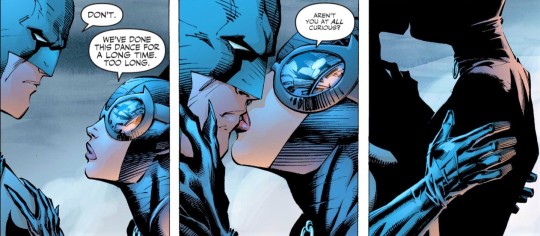
He does occasionally instigate affection with his children/proteges, though usually it’s in instances where they obviously need comfort. Bruce isn’t always great at handling complicated emotional situations, but grief and trauma is something he understands very intimately, and he never hesitates to physically reassure people who are in that kind of pain.
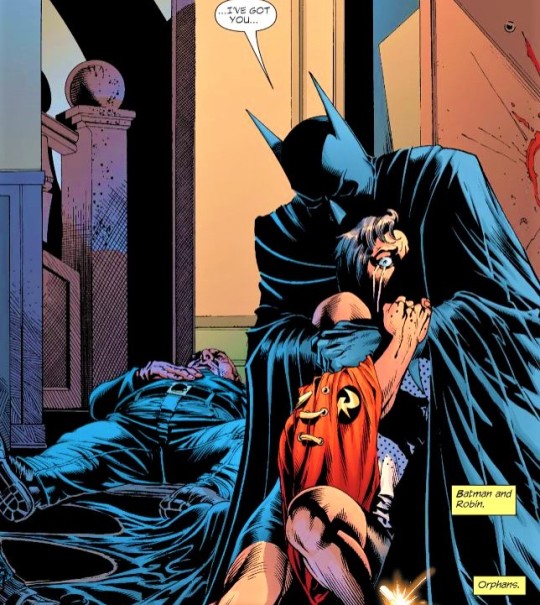
In situations where someone isn’t in the active process of being traumatized, he’s less forward with physical affection. That doesn’t necessarily mean he’ll reject it if it’s instigated — depending on who you are, of course. I’m guessing he wouldn’t put up with hugs from random members of the Justice League. Superman is his best friend and he would probably try to wiggle out of 90% of Kal hugs if doing so was physically possible. Most of his loved ones don’t really spring physical affection on him unless they need it or it’s an especially emotional moment, however. It’s not really Bruce’s primary love language.
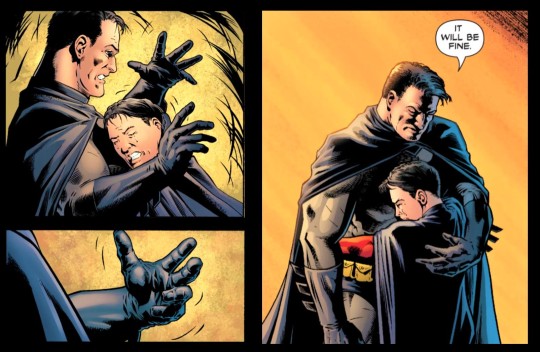
Jonathan seems even less physically affectionate than Bruce, though obviously doesn’t have a lot of opportunity to demonstrate how he feels either way. Master of Fear offers the only example of him expressing explicitly romantic affection that I know of (unless you count his terrorizing Becky Albright in New Year’s Evil as physical affection, which... might be how he’s thinking of it...?), and it’s entirely instigated by Sherry Squire. He does ask her to the Halloween party, but she’s the one who takes him down to the furnace room for some “one-on-one” time and tells him to kiss her.
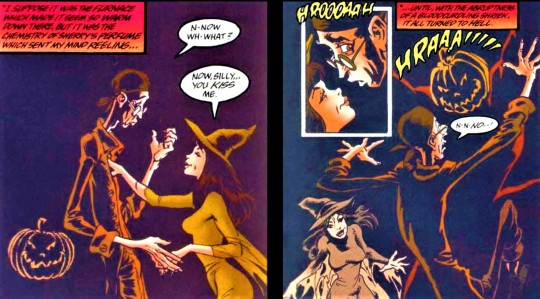
He also notably does not actually get a chance to kiss her, mainly because the whole thing was a prank meant to humiliate him. This might be why he doesn’t try to instigate anything similar with his next crush, Dr. Linda Friitawa (again, unless you count Becky Albright, but I can’t find New Year’s Evil to read anywhere so my only knowledge of his interaction with her comes from Tumblr. I’m like 80% sure he was supposed to be interested in her romantically, but asking someone to do supervillainy with you isn’t the most direct way to express attraction, so I’m taking that as more obliqueness from Jonathan).
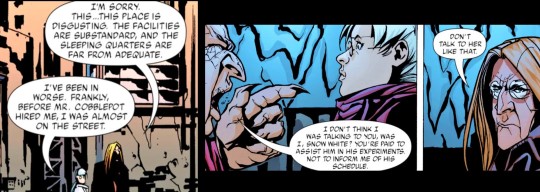
He never expresses any direct romantic interest in Linda, but at the very least he clearly cares about her more than he cares for most people, since he, like. Defends her in conversation and apologizes to her for things that aren’t even his fault. Which means a lot, coming from a sociopath with no regard for human life. They do hold hands at one point, but Linda reaches out to him first, and he waits to see if she’s going to back away from his reciprocated touch before he reaches for her other hand.
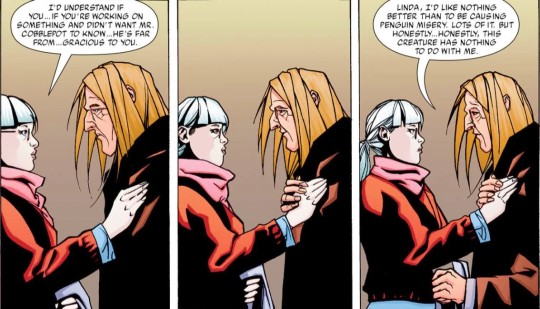
He never instigates anything further with her, possibly out of fear of rejection. Unfortunately, it turns out that this was a good call, because Linda was only pretending to be nice to him while Penguin was paying her to experiment on Jonathan without his knowledge. When Batman figures out what they’re doing, she immediately fucks off and starts dating Black Mask.
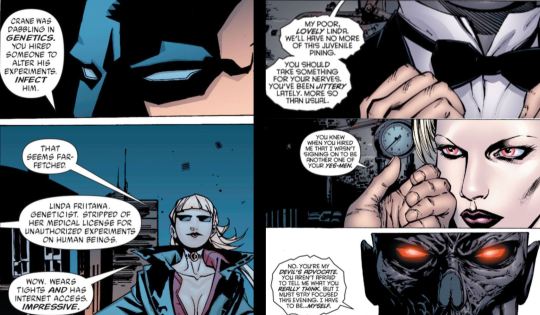
Even more unfortunately, his 45 seconds of hand holding with Backstabby McMad Scientist is probably the only mutual physical affection Jonathan has ever experienced in his entire life, so honestly I have no idea if he would be more into it as a concept if it was offered to him more often. He’s clearly willing to return physical contact when it’s initiated by someone else, so maybe it is something he would seek out in an actual relationship? He DOES get handsy with Bruce when he has Batman tied up sometimes.

9. What is the most embarrassing thing they have done in front of each other?
Trip out on fear toxin, both of them, hands down. There are few things more embarrassing than, as Jonathan aptly describes it, being “reduced to whimpering quivers” in front of your enemy. Especially an enemy who’s presumably jotting down notes on your worst fears, since Batman/Scarecrow fights tend to just be competitions in who’s more frightening.

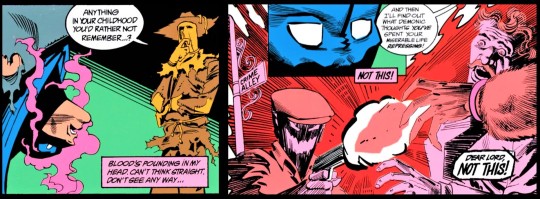
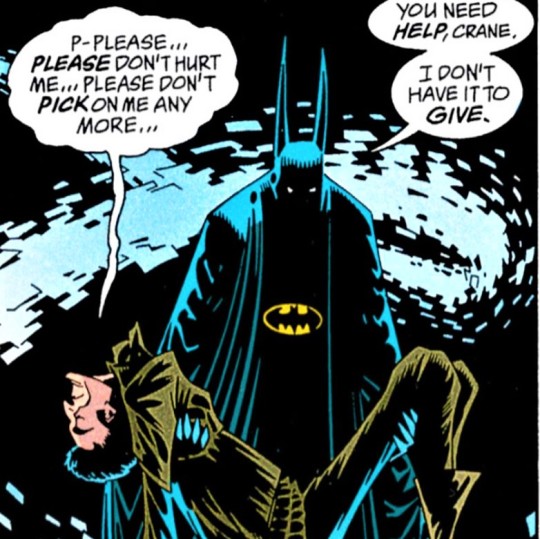
11. What do they hide from one another?
I mean, obligatory mention of the fact that Bruce hides things from absolutely everyone (with the possible exception of Alfred, because Bruce trusts him as completely as he is capable of trusting anyone, and also because it’s really hard to hide things from a parent whose involved in every aspect of your life and already knew you before you developed your pathological need to obfuscate your feelings and intentions).
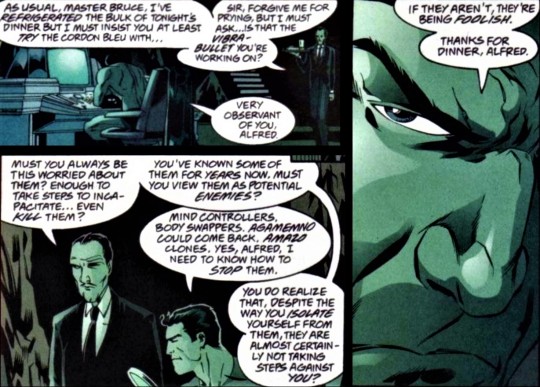
As Wonder Woman pretty aptly describes during the Tower of Babel arc, even Bruce’s closest allies are never going to hear the full story from him. So it’s deeply unlikely he’d ever be 100% truthful with a supervillain, even if they got close AND Jonathan reformed.
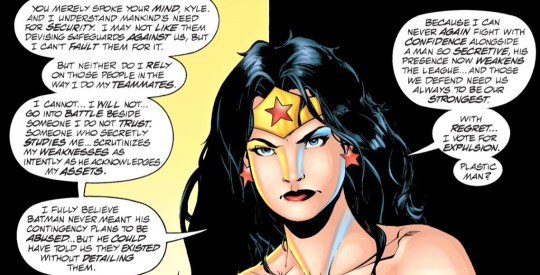
But it’s notable that Jonathan’s fear toxin has actually given him a more honest look into Bruce’s psyche than he would ever purposefully give to people who aren’t close family members. And by “close family members” I again pretty much just mean Alfred. Unfortunately for Bruce, nothing forces emotional transparency like mind altering drugs. Fortunately for Jonathan, nothing forces emotional transparency like mind altering drugs! Not that I’m recommending that anyone drug a romantic partner into being honest with them. But Jonathan is a trained psychiatrist, so I assume his psychological know-how combined with insights gleaned from the dozens of “sessions” he’s had with Batman in the past would leave him more prepared than most to decipher the mystery that is Bruce Wayne. (@heroes-etc: riddler is SEETHING.)
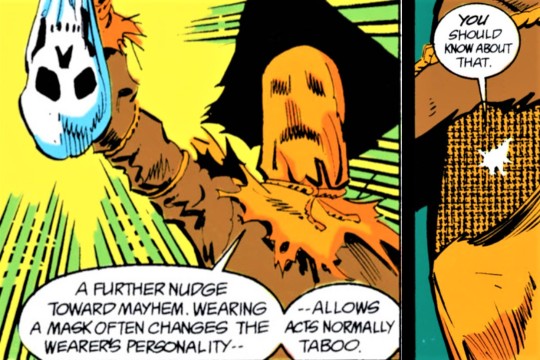
Jonathan meanwhile is more than capable of putting together a clandestine scheme, but in respect to himself he’s actually pretty straightforward. Though his driving motivation in this continuity gets more and more complicated over time, from the early 90’s “I just like fear” to the early 2000’s “my Granny tortured me with birds when I was a child and now I’m obsessed with inspiring the same fear and submission she forced on me onto others,” what doesn’t change is his willingness to monologue about it to anyone who’s listening.
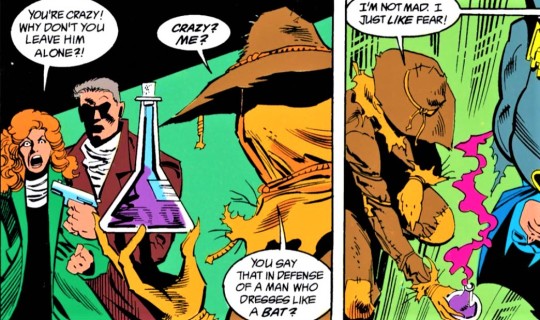
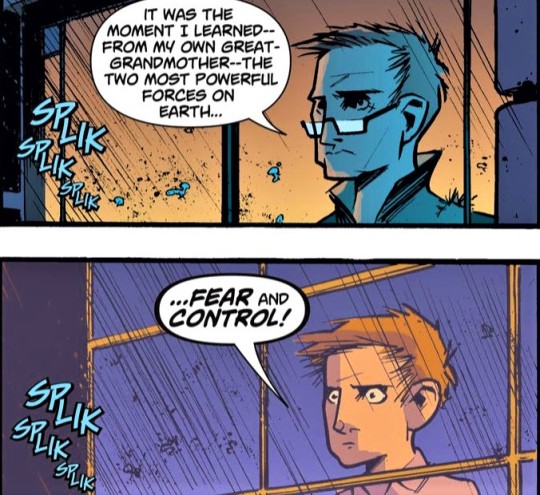
Also, anything that Jonathan is unable or unwilling to go into detail on, Bruce is more than capable of puzzling out himself. In Scarecrow: Year One he successfully tracks down Jonathan’s old home to recover and read through Granny Keeney’s diary, and after Scarecrow’s Master of Fear origin was published, it’s clear that Bruce has done his research on Jonathan’s childhood. There’s even a (presumably unintentionally) hilarious scene where Bruce pauses mid-rescue of a man that Jonathan has kidnapped and traumatized with fear toxin to lecture him on having bullied Jon in high school.

Is this really the time, Bruce???
(@heroes-etc: oh 100% he nailed that timing.)
13. When do they realise they should get together?
Well, circling back to Tower of Babel, it’s revealed when Ra’s al Ghul has Talia steal Bruce’s contingency plans for defeating the Justice League that Bruce has “borrowed” Scarecrow’s fear toxin in case he has to take down Aquaman.
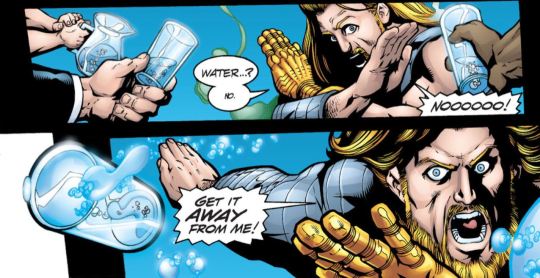
This was back when Scarecrow had a number of different toxins that induced different phobias, or made people hallucinate hyper-specific nightmare scenarios (such as “being eaten alive by roaches from the inside,” for some terrible reason). Batman notes in his contingency files that Scarecrow has already done the work for him; presumably Jonathan had already designed a formula to induce hydrophobia, so all Bruce had to do was steal a vial of it from a crime scene.
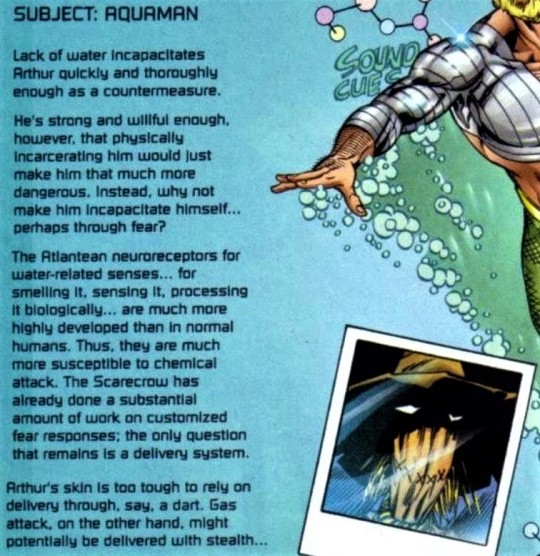
(The sentence “Why not make him incapacitate himself... perhaps through fear?” alone is like 90% of why I think these men would get along like burlap on fire if they ever actually cooperated on something. Also, unrelated, but the polaroid of Jonathan he has in the Aquaman file is weirdly adorable.)
Bruce’s plan for Arthur is incredibly effective, and notably also Bruce’s only contingency that isn’t either inherently lethal or a ruthlessly sociopathic betrayal of emotional vulnerabilities that had been revealed to him in trust and friendship (RIP Kyle Rayner).
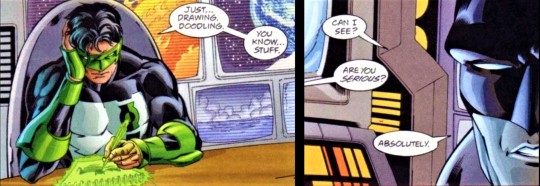
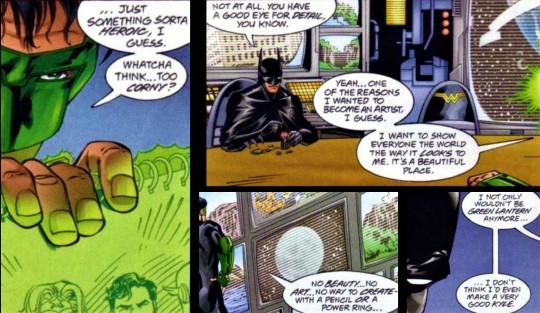
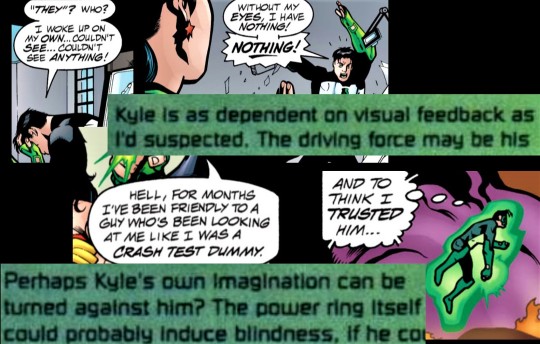
(Notably, Bruce’s plans for Kyle and several other leaguers directly involve using their worst fears against them, even without a fear toxin conveniently tailored for this purpose. Bruce just really likes using fear as a weapon against people.)
After Tower of Babel, Bruce obviously needed to create new contingencies, since the whole point is that they were secret plans that no one could see coming. In canon, Bruce goes on to create the A.I. satellite Brother Eye for this purpose (which backfires even worse than his first set of contingency plans, because of course it does). But I think an interesting alternative could have been Bruce tapping Jonathan for more toxin strands tailored to taking down the Justice League. If Bruce Wayne offered to pay Scarecrow’s way out of Arkham in order to develop formulas that could neutralize the world’s most powerful superheroes, is there any way that Jonathan would turn him down? I mean, obviously he would plan on betraying Wayne at some point, and Bruce would similarly be working against Jonathan’s best interests. But maybe if they set aside their “who’s scarier” dick measuring contest to work together for once, they could come to recognize their shared passion: scaring the shit of people.
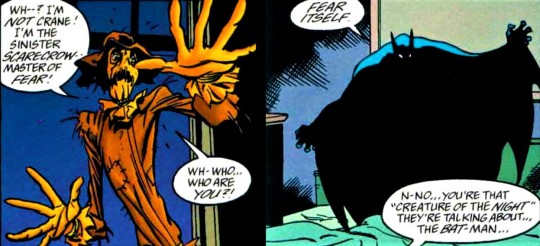
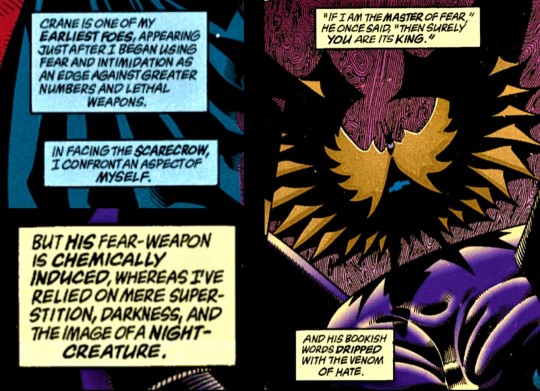
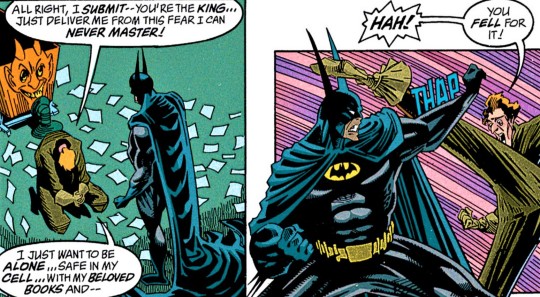
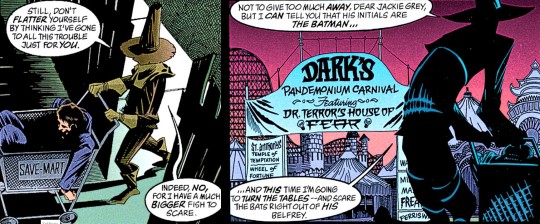
Also, the Jonathan in this continuity really likes books. And you know what’s a reliably sustainable source of books that can’t be confiscated by the authorities? Dating Bruce Wayne. The manor alone probably has an insane amount of rare books that have been hoarded by his family over the years. It’s like a weird reversal of the Beauty and the Beast, where the rude rich guy who gives a library to the love interest he may or may not have technically kidnapped is the pretty one.
21. Where do they get nervous about going with one another?
If they were dating, I’m guessing Jonathan wouldn’t want to go anywhere in public with Bruce at all. Bruce Wayne is a celebrity bachelor, and celebrity bachelors get a lot of attention, and people who take celebrity bachelors off the market get a lot of NEGATIVE attention. The public reaction to Bruce settling into a committed relationship with anyone would be the kind of weirdly resentful gossipy judgement that the girlfriends of famous princes or actors or musicians always get from tabloids and entertainment television, but in Jonathan’s case it would be a million times worse. Not just because he’s a supervillain, because if there’s any town that would expect its most eligible bachelor to eventually date a supervillain, it’s Gotham. But more specifically because “ugly social outcast” is one of Scarecrow’s most enduring character traits. Not exactly the traditional trophy wife. And though Jonathan’s Scarecrow identity seems to distance him from a lot of the shame he suffered growing up, I’m guessing that the kind of spiteful vitriol that would follow him anywhere he accompanied Bruce would at the least bring back some very unwanted memories.
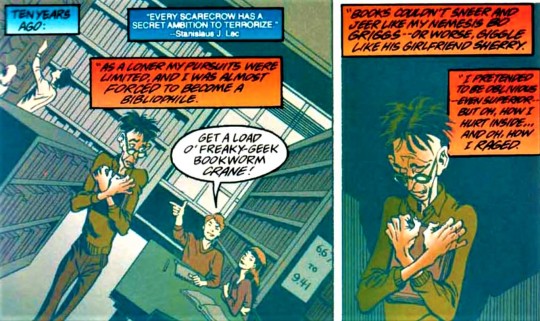
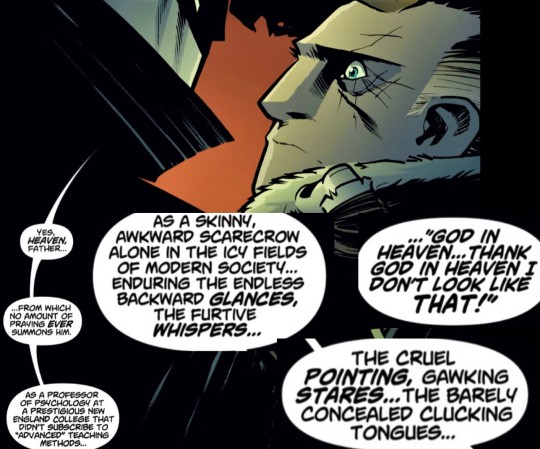
Bruce probably doesn’t have the same discomfort Jonathan would with being seen together in public. He doesn’t care if people think Bruce Wayne is insane or lacking in judgement as long as they don’t think he’s Batman, and I’m sure he’d find a way to spin “dating a man who prefers to dress exclusively in burlap” into something appropriately characteristic of playboy idiocy. But while he'd definitely respect Jonathan's wishes to stay out of the public sphere, he would probably enjoy any opportunity to bring Scarecrow into Gotham high society, since his presence would definitely shake up a party, and Bruce is generally extremely bored at any social event where he doesn’t have anyone to snark with. And with Jonathan’s scathing wit as entertainment, Bruce might one day fulfill Alfred’s wish and actually make it through an intermission sometime.
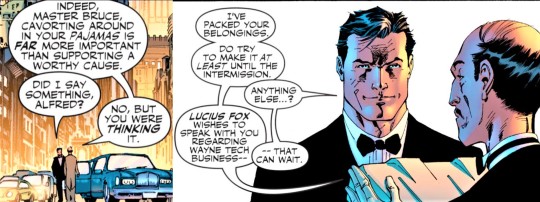
I’d say that Bruce would be nervous about taking Jonathan out for “field research,” but I’m sure it would be one of Scarecrow’s requirements for any long term collaboration, so it’s something that he would have to get used to pretty quickly. He would probably endeavor to keep Jonathan away from anything that could retrigger his less healthy behaviors. On the other hand, it’s not like Bruce does that for himself, so it stands to reason that he probably wouldn’t be able to successfully control Jonathan in that regard either.
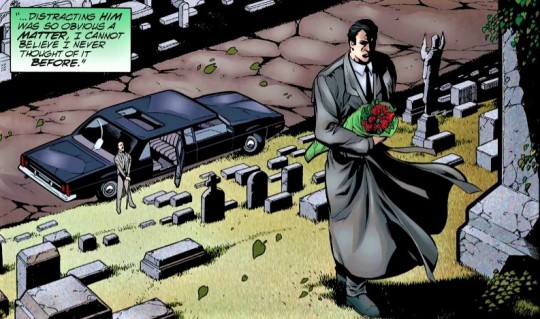
It doesn’t help that one of Jonathan’s primary motivations in villainy is his childhood, which is... exactly the same thing that Bruce is fixated on. A significant portion of Scarecrow: Year One is the two of them waxing poetic about how similar they are in this regard.

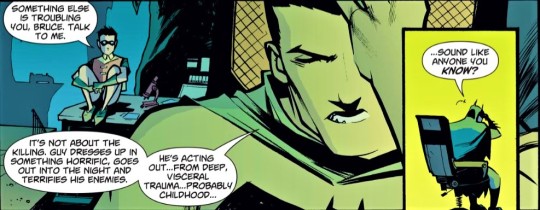
Relating to this, even though it might be a terrible idea, I don’t think Bruce would be able to resist encouraging Jonathan to reconnect with his mom. Bruce would never recommend for someone like Cassandra to seek out a relationship with her father, but if someone he cares about has a LIVING parent who WASN’T abusive to them? It seems unlikely that Bruce wouldn’t advocate for reconciliation. Jonathan’s dad obviously never cared about the teenage girl he knocked up or their bastard child, but Karen Keeney is a different story. DC Holiday Special ‘09 makes it clear that Jonathan was taken away from her against her will, and she’s spent a significant portion of her life wracked by guilt imagining what the woman who abused her was doing to her son.
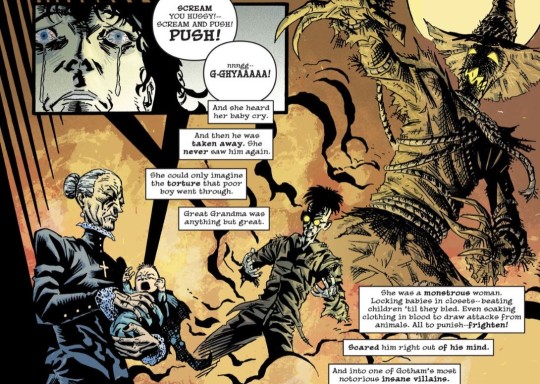
Ultimately she attempts to commit suicide because she feels personally responsible for every terrible thing her son has ever done, which is tragic because really she’s the only member of the Keeney family completely blameless in the creation of the Scarecrow. In Scarecrow: Year One Jonathan clearly resents her for leaving him and moving on to have another baby that she actually did keep, which I would call a really paranoid case of jumping to conclusions if it didn’t seem extremely likely that Granny Keeney told him his mother didn’t want him and left him to be tortured on purpose.
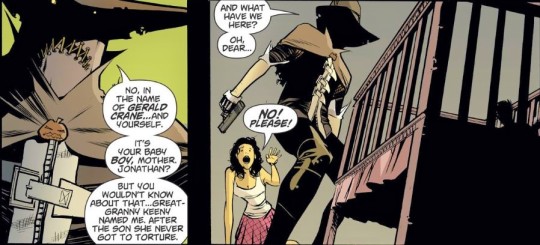
(Side note, it is REALLY weird how young Karen Keeney is depicted in Scarecrow: Year One. At times her son looks older than she is, and it doesn’t help that her second born child is an infant for some reason. Even if Jonathan is only thirty years old here, then unless she had him at younger than fourteen, she should already be in her mid-forties. Why did she only have a second child so late in life? The implication with her abusive husband is that she ended up getting trapped in a bad relationship for survival when her family kicked her out as a teenager for disgracing the family by having Jonathan. It would make way more sense for her child with him to be at least in elementary school. Also the scene would have been way more interesting if Scarecrow’s sister was old enough to talk.)
Thankfully Deadman manages to convince Karen to hold on to life long enough for someone to call 911, and she ends up surviving the suicide attempt. But were Jonathan ever to reform, it seems like reconciliation would be really healthy for both of them, since miraculously Karen still seems to care about Jonathan despite everything he’s put her through, and they’re both clearly still suffering from the after effects of Mary Keeney’s abuse.
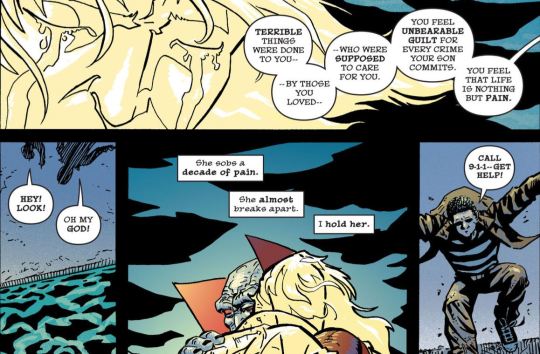
Bruce would be enthusiastic about this prospect for obvious reasons, although he would presumably still be nervous about the possibility of everything going terribly wrong. And even if everything went perfectly right, he would STILL be nervous, because everytime Jonathan goes to see his mother there’s a chance that she will mention the time that she kissed Batman full on the mouth. And that is not information you would ever want your psychologist boyfriend to know, unless you want to be mocked with Freudian buzzwords for the rest of your natural life.
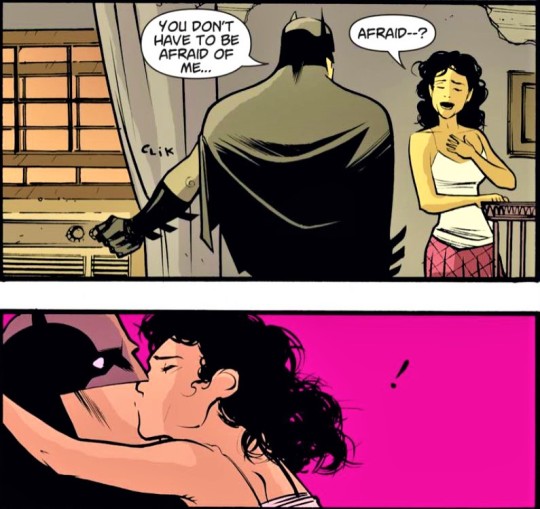
(...This would also count as a thing that Bruce hides from Jonathan.)
#scarebat#jonathan crane#scarecrow#bruce wayne#batman#i just they're neat#it's all about those shared interests#and by shared interests i mean subjugating your enemies through fear#ship meme
51 notes
·
View notes
Text
Grounded: Level 6
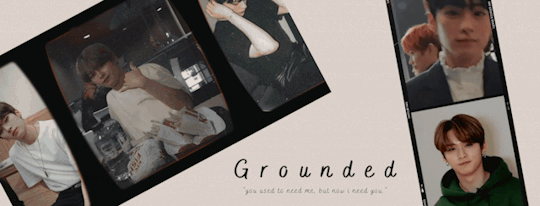
Level 5 | Level 7
Member: Minho (Lee Know)
Genre: idol minho x idol trainee reader, angst cause is it a dana fic if there is no angst
Taglist: @jaehyvnsvalentine @licorice526 @lolwhatameme @felixn-recs @yunapixie

[J U N E 2 0 2 0]
“COOKIN’ LIKE A CHEF I’M A FIVE STAR 미슐랭 "미"의 정점을 찍고 눈에 보여 ILLUSION!”
“Jesus Christ!” Ju Rin screams at all of you, yelling at the top of your lungs as you follow the lyrics and fanchant of the song. “The Hell’s wrong with you people?!”
Minjung giggles until she’s sobbing and rolling on the floor, So Eun and Gahyun take turns singing the lines of the different members while you get to your feet and stretch.
You’re about to head out the studio to the bathroom when Ju Rin calls out to you, casually jogging over to you by the door.
“Before I forget, Bang PD said he wanted to see you in his office tonight.”
The new information strikes an uncomfortable chord in you.
“What? Why? Did I do something-”
“No,” Ju Rin quickly shakes her head, hand coming to rest on your lower arm. “It’s time to make a decision. A real one,” She looks behind her shoulder and at the bunch of girls who were all younger than the both of you before turning back to you. “One that would be forged in your signature and last for the next 7 years.”
Ju Rin’s eyes hold worlds of both caution and wander. This is no longer just a game of “let me see how long more I can train before I think I’m ready”. It has become a fact that the company believes you’re ready, and now they’ll be presenting you with an opportunity of a lifetime. Something that you wouldn’t be able to reverse once you’ve agreed to it.
“He said that if you can’t give him an answer tonight, he’ll understand, but you still need to make a decision after all... So,” She pauses and rubs your upper arms. “Think carefully, and make your decision wisely. I don’t want you to walk into something you’d want to walk out of.”
You’re in the pantry of the floor where it was quieter than normal - TXT had a schedule that day and wouldn’t be spending the day in the studio. The chance of a lifetime’s sitting in the heart of your palms now, all you have to do is to pick up a pen and write your name down before the next 7 years of your life would be planned out for you.
You weren’t sure if you needed someone’s motivation or encouragement to well your bravery for tonight, but you knew for sure you just needed to know someone would be there for you.
You: Hey, call me when you’re free? I just... thought I should tell you something.
Sucking in a deep breath, you hit send and drop the phone back into your pocket. The ceramic mugs by the coffee machine calls out to you, and you run one under the tap when you feel the vibration in your pocket. A smile stretches across your face, pleasantly surprised at the speed of reaction now.
“That was quick,” You flick the mug, water droplets hurling back into the sink.
“What is it? Better be worth it, IN-ie just brought back some fried chicken and any longer I’ll- YAH! DON’T TOUCH MY SHARE!”
A sharp ring echoes through your right ear canal as you pull the phone away from your ear, “My God-”
“Yes,” The man returns to the line. “What was it you needed to tell me about?”
“Are you sure this is a good time?” You place your mug under the coffee machine nozzle and press the cappucino button. “I can call you back later-”
“No, no, it’s fine. We’re having our lunch break anyway. What’s wrong? You sound stressed.”
The steady stream of water, then coffee and milk creates a layer of foam in your mug.
“Ah... Let me guess - It’s the contract.”
“Mm,” The hum might’ve been overwhelmed by the sudden cough and whir of the machine, but it goes back to it’s gentle chittering as the stream slows to a few droplets.
“What are you worried about? You’ve already spent so much time training, not to mention building that bond with your members... Are you the only one that has yet to sign the contract?”
“No, they’re going by position and age. Ju Rin’s the only person who’s signed it and the rest don’t know yet.”
“Strange that you guys didn’t have the signing together.”
“Knowing Ju Rin, she probably wouldn’t have wanted that,” A pause as you process the thought of her being your leader. There was nobody else better to be it than her. “She wouldn’t have wanted anybody to sign it under pressure, so she probably suggested the individual signing to Bang PD instead.”
“Fair,” He pauses. “So, what now?”
“I don’t know.”
“’I don’t know’ doesn’t sound like a great response at this point of time.”
“I know... I just... What if... What if I’m not good enough, you know? What if I mess up along the way and Ju Rin or BigHit’s gotta clean up my shit?”
“Everybody messes up at some point or another. You’re gonna be under constant scrutiny, possibly apologise for things you don’t have to apologise for, but that’s just a small cost you need to pay for pursuing your dreams. You don’t get to paradise without riding the worst storms.”
You wrap your fingers around the ceramic of the cup, carefully pulling a sip of the foam onto your tongue.
“I can hear you, you know.”
“Sorry,” Licking the foam off your upper lip, you snicker to yourself and turn to the door of the pantry, the metallic frame of the doors showing you a version of yourself that you wouldn’t have recognised four years ago.
“Anyway, we both know you’ve already made your decision when you decided to stay for so long, and meet all your members. You’re only hesitating now because you’re afraid of mistakes, so if it makes you feel any better - which I know probably won’t - you will mess up, but it will be okay.”
“Great pep-talk,” You sneer into the receiver end of the phone. Minho’s laughter echoes through the line, and you can already picture his eyes turning into thick, dark lines as he smiles.
“I always be here, alright? Nothing to fear.”

[N O V E M B E R 2 0 2 0]
“I’m not joking when I say I think Gahyun has a crush on Beom,” The drifting dried leaves on the floor crunch under your shoes as Minho turns to you, flicking a small twig out of your now blue-dyed hair. You just had your pre-debut photoshoot, and they were set to be released sometime in 2021.
“Should you be telling me this information?” Minho readjusts his beret, making it fit better on his head while he leads you around the corner and up the stairs to some secret back door.
“Repeating this information to a bunch of girls who already know this information gets boring. Don’t you guys have crushes on like - TWICE or ITZY or something?”
“Oh, that’s a deep grave to dig,” He pushes the door open without hesitation, the scent of grilled chicken and wine hitting you straight in the face.
“Aw, come on!” The whine is cut short when a waiter comes by to tend to you. It wasn’t a surprise when the waiter recognised him, even with all that disguise on. The restaurant was two floors worth, but only the first was open to the public. The second - specially reserved for idols.
Man, the things Dispatch would do to know this place exists and the people idols bring here.
“We’re serving the Christmas specials today because we know a lot of companies are letting idols go for an advanced holiday,” The waiter pulls out two menus from under the desk where you’ve stopped, turning around and gesturing for you to follow him. “I’ll be your waiter for today, so just call for me if you need me.”
“Alright, thank you.”
You offered the waiter a smile, forgetting that the mask was hiding it. The waiter bows and leaves the two of you alone in the corner of the room, allowing Minho to finally feel comfortable enough to remove his mask.
A gasp gets sucked through your throat when you remove your mask, eyes glued to the menu. “Tangerine grilled chicken and steak!”
Minho doesn’t bother to stifle the yawn that was coming out from his lungs, eyes halving into long lines.
“Are you allowed to drink?” You notice the drinks menu, nearly the entire page covered with some kind of beer, soju, wine or sake.
“I mean, I’m technically off work, and all those news sites don’t know this place exists so- as long as I’m not drunk, why not?”
“Very nice,” Scanning the list of alcohol, you decided Minho needed some outlet of release before he goes back to work - also known as being stressed 24/7.
Minho helped place your orders, and instead of the two glasses of wine you had initially wanted to order, he calls for an entire bottle of 1940 Chateau.
The waiter doesn’t seem at all bothered that the young idol was ordering a three-hundred-dollar bottle of alcohol, only focused on noting the food that was spewing off Minho’s tongue. The waiter then thanks the two of you, promising to return with the wine first before he leaves.
Leaning forwards across the table, your eyes frown at him. “Are you nuts? There’s no way we’re going to be able to finish that.”
Minho interlocks his fingers and rests his chin on them with his elbows perched on the surface of the table. “You underestimate me.”
An eyeroll finds you, snorting in exasperation before leaning back in your seat.
“I’m sorry for being busy recently. Pre-debut’s pretty tough.”
“I love how it took you three years before you understood that.”
You roll your eyes again.
“Anyway, how’s work? How are your members?”
“Ah- I bring you out for a nice meal and you repay me by asking me about how much money I earn? Eish-”
“Wha-” Hurling a pack of that alcohol wipes across the table, he snickered when it hits him and lands on the floor. “You’re really full of shit.”
Minho grins that gummy smile of his, pulling off his cap and ruffling his hair after picking up the pack of alcohol wipes. “Work’s fine. Mr Park Jin Young, however, suggested we do a 2PM cover during the SBS Gayo Daejeon festival at the end of the year.”
“2PM? Aren’t their concepts kinda... mature?” The utensils on the table garner your attention as Minho scans the message that popped up on his phone.
“Yeah, so guess what song we’re covering?”
You look up at the hint of pride in his voice, and his cheeks were cupped in his own hands, cutely staring at you.
A disgusted sneer finds your face and you pull one of his arms out from under him to stop the horrid sight. "Let me guess... Again and Again?"
"Wow, you're really good-"
"Aw, thanks-"
"At guessing the wrong answers.”
He flinches when you almost lunge forwards, fork in your grip.
"Why do I put up with you?"
"Because you love me too much to stop," His eyes are filled with playfulness, the kinds that you'd be able to recognise just by looking at his gaze.
"Ew," You don't take into consideration his choice of vocabulary, sitting back down in your seat when the bottle of wine comes. "Don't get too ahead of yourself."
Minho bites on his bottom lip to control the giggle that’s about to explode from his mouth, nodding subtly at the waiter so that he could get the bottle of wine open.
“Anyway, he suggested My House.”
Minho watched intently as your eyes double their original size, with the gentle gurgle of the wine being poured into the two glasses being the closest source of noise. He knows you’re about to burst out into some manic laughter, so he already has his lips tutted and and eyeroll ready to give himself a headache.
“My House?” You can feel your brows going so far up your forehead, it feels like you’re stretching the skin. “Park Jin Young wants a bunch of kids dancing to that song that’s about bringing a girl home and smashing? Ha!”
“Do you have nothing nice to say?”
“Says the one who just dissed me for giving wrong answers,” The waiter closes the wine bottle and places it into the ice bucket on the tray next to the table. Minho thanks the waiter, shaking his head as you take the glass and swirl the alcohol.
“I’ll let you win this one round,” He takes a sip from the wine. “So, I heard about the finalised line-up about your group.”
“Oh, that was a blast,” You offer a hearty laugh, memory unable to wipe away the visual of So Eun being crowned the ‘Centre’ of the group. Everyone had expected Gahyun, the Visual, to be the centre, and frankly, she hated it. So, it was all glitter and fireworks when it was announced Ga Eun be the center, essentially making her vice-Visual. You push your phone across the table, an unofficial and unpublished version of the BigHit website rolled up on the screen.
“Wang Ju Rin, Leader, Lead Vocalist, Sub-Rapper. l/n y/n, Main Dancer, Lead-Rapper, Sub-Vocalist. Choi Ga Hyun, Lead Vocalist, Lead Rapper, Lead Dancer, Visual,” He pauses. “Ga Hyun sounds like a Han Jisung.”
“I see he’s your favourite member today.”
Glaring at you, he takes his time to return to the screen. “Kang So Eun, Main Rapper, Lead Dancer, Sub-Vocalist, Center. Gwang Min Jung, Main Vocalist, Lead Rapper, maknae,” He slides the phone back to you. “Remind me how old the rest are again, besides you and Ju Rin?”
“Gahyun and So Eun are 2001 liners but Min Jung is a 2003 liner.”
“Lovely age gap,” He shakes his head. “Then again IN debuted when he was 16 so I guess...”
“Funny how I was 16 when I was scouted,” You place the fork down, suddenly pulling the atmosphere down with you.
“You talk about this as if you can erase that signature on that contract.”
“No, don’t get me wrong, I know I don’t regret it. I just-” A pause to collect your thoughts. “What else would I be doing other than this, you know? University? Working in some shoddy cafe?”
“What are you- writing a narrative for yourself now?”
“Jesus Christ, will you shut up for once in your life and let me finish my piece-”

[D E C E M B E R 2 0 2 0]
The manager for Stray Kids was busy sheltering you and a few other guests that the members themselves had chosen to be invited to the Gayo Daejeon Festival before the year ended.
TXT was already in the building rehearsing and your trainee-members would be coming later nearer to their performance.
Rain peltering against the black umbrella, the staff struggles to keep you and the other guests out of sight, though you've already been warned by the person who invited you to come in sunglasses and a mask. (Not that it was legal to walk around without one now anyway).
You've met the members’ siblings before, so the situation inside the vehicles were more than comfortable. The staff at SBS hands all of you visitor passes, with your name and the name of the person who invited you printed on the tag. The manager brings the group of you into the studio where the stage was set up, just in time to watch Stray Kids perform a practice round - this time, a cover of 2pm's My House.
"Wah!" Seungmin's sister exclaims and covers her mouth (as if her mask wasn't already doing the job), her free hand landing on your shoulder. "What is Lee Know even wearing?"
It hasn't even caught your attention, because you were so preoccupied with their voice checks. But you heed her advice and search for Minho on stage, eyes falling on someone back-facing you with a half-assed view of his back covered with a miserable layer of net.
"Someone’s stylist felt cheeky today," Laughing under your breath, Seungmin's sister gently nudges you as a response. Minho was fixing his earpiece when his eyes start wandering, and even in the bad lighting off the stage, he could still spot you.
He's waving like he hasn't seen you in months, though you just met him a few weeks ago when his CEO had given them an advanced Christmas weekend vacation.
“Okay, take a fifteen minute break! Can I get I*ZONE, THE BOYZ, Jessi to get ready?”
The members bow and thank the camera men and the director of the event, most of them waving to their guests standing around you. Minho looks to you and waves subtly, sweat sticking his brown hair to his forehead as his breathing calms.
Right now, Minho was doing nothing besides making snot-faces at the camera with that stupid inner-netting piece he’s got that exposes his back.
Sickening, but he knows it works in his favour.
“Everyone in places! We’re filming your fancams for this one too but keep your eyes on the main cameras!”
The members yell out scattered “yes”es and return to their positions, fingers fixing their fits and microphones. The music starts, and you decide you’ll probably never ever get sick of how the whole group is able to snap into professionalism. But of course, your eyes still naturally gravitate to Minho.
He told you over test that he had been given the chorus -- something that his CEO has never really considered. (Minho wasn’t a great vocal; he was more commendable in his dance techniques but he’ll never improve if he’s never given the chance, right?)
You suck your lips between your teeth when you notice his anxiety gets the better of him, and he messes up in the chorus choreography just as he sings “10분 뒤에 저 앞에서.”
He’s definitely going to get annoyed over this mistake later.
Changbin's sister cannot contain the scream that emits out from her when you are let into the Stray Kids’ dressing room. Jeongin rushes to his little brother, hoping to pull him into a headlock. One of the stylists was busy helping Minho remove his blazer belt when he notices you standing behind him in the mirror.
But before he can greet you, Seungmin rushes to your side along with his sister, who drags you away to look at some special edition Stray Kids merchandise sitting in the corner of the room. You shoot Minho a slightly apologetic look, allowing Seungmin's sister to pull you across the room to study the albums and photocards you would probably receive by the end of the year anyway.
Seungmin's sister gushes about the design of the albums, Christmas themed and all with a rather recent and unseen group photoshoot of the group. So it doesn't take long before she's completely occupied in staring at Chan's picture in the album, and Jisung takes the opportunity to strike up a conversation with you.
“Hey! I finally got to meet you properly, I’m sorry I couldn’t greet you well back when you visited with Yeonjun hyung.”
“Oh, no,” You place the album back to the table and turn to Jisung. “It’s fine. I hope the fruit basket was good.”
“It was great, actually. Chan made a fruit salad out of it,” Jisung shoves his hands into his pockets. Your eyes can’t help but glance around the room, and you catch Minho’s eyes flitting away from you and Jisung in the reflection of the mirror he’s staring at.
“So, how are the shots? Pretty cool, huh?”
Your eyes follow his hands that reach for the albums that are still sitting comfortably on the surface. “Yeah, of course. Was it shot in a pre-made studio or was the lounge already set up like that? Colors are pretty.”
“It was a lounge, actually. Downtown in Gimpo. They had a cafe nearby too, and the food’s great. I was wondering if you’d like to-”
"Yah," Throwing his arm around Jisung’s shoulders, Minho was now changed out into a loose, black tank top. Your eyes gravitate down to where his skin is usually covered, but Jisung's sly smirk at you forces you to roll your eyes away instead.
"Oh, yes, Lino hyung?" Jisung has the widest grin on his face as he happily pulls Minho into a hug, even resting his head on Minho's shoulder. It's a strange sight, seeing Jisung suck his lips between his teeth. Better yet, Minho had the most confused look on his face just seconds before he shoved Jisung off him.
“You’re an absolute disgrace,” Minho shakes his head and winces in disgust. “There are better ways to ask someone out, and the first step is to ask the right person out.”
#lee know#lee know scenarios#skz lee know scenarios#stray kids#stray kids lee know#skz lee know#skz lee minho#stray kids lee minho
21 notes
·
View notes
Text
Press: Elizabeth Olsen’s 20/21 Vision
The Marvel star takes us inside her transformation to a new kind of hero




GALLERY LINKS
Studio Photoshoots > 2021 > Session 002
Magazine Scans > 2021 > Grazia
GRAZIA: Elizabeth Olsen is a trooper. We are in a field in Surrey on the outskirts of the Marvel studios; it’s a biting minus one and she is standing in a Chanel broderie anglaise sundress and increasingly soggy UGG boots. Her feline cheekbones face skywards, but Olsen is slowly sinking into the mud, trilling out high notes to keep herself warm (possibly distracted) and of course with spirits high. “It was the wind I think, that was worse than the sideways rain,” she jokes as we trundle back to the soundstage hangar that we are using as a studio. It’s the kind of moment that could go viral on Instagram, that is, if Olsen were on social media. Yet one of the biggest stars of our current cultural moment is completely offline – and that surprising fact might just be the least interesting thing about her. If anything, it is a sign of how Olsen has come into her own as a confident, decisive star with the power to create her own universe.
On the cusp of her 32nd birthday, Olsen is fastidious and professional, yes, but also bright, engaging, creative, and collaborative. Born and raised in the California sunshine, she is surprisingly at ease in the blustery conditions that deluge the English countryside in late January – or, it’s that she’s very good at acting. “It was one of the ugliest days of this winter – just hilarious – but I knew we wanted the shot,” the 31-year-old actress says.
Since October, Olsen’s been living in the leafy British countryside with her “man-guy-partner,” musician Robbie Arnett, just a short drive to the Surrey compound where Doctor Strange is being filmed. It’s a closed set, masked in secrecy as much as the socially distanced masked crew dotted all over the 200-acre studio. “It feels right being in a small city right now,” she says.
Indeed, Olsen is a modern-day Renaissance woman. Learned and dedicated to her craft, she studied at New York University’s Tisch School of the Arts, with a semester at the Moscow Art Theatre School studying Stanislavski. (Surely, no matter how much of a genius the Russian theatre master was, he never could have conceived of the Marvel universe.)
Approached with the concept of WandaVision, “I thought it was perfect for television, and a very original idea that made me excited,” Olsen says. Also, she was happy she would get to work with Bettany again: “He’s very precise, like me.”
In many ways, WandaVision is a love letter to the first American television heyday. Olsen, who stayed up late watching Nick at Nite reruns as a child, says it’s a bit of a homecoming in that way. “I was a very hammy, performative child,” she explains. “So, I do think I got to live out some sort of childhood dream doing the show.”
“The highlight was really getting to tell a story about these superhero individuals told in different decades of American sitcoms, trying to match the tone of those sitcoms in order to help orate the story,” she says. “But keep it playful and fun.” Little did she know just how much we’d need that.
Half-filmed pre-pandemic in Atlanta and half post-pandemic in LA – with a six-month hiatus in-between “until all the unions figured out to work safely” – WandaVision was released almost a year into the pandemic. In many ways, it is an artifact of its time: centered upon a yearning for the simplicity of earlier days, yet shot through with the creeping realization that such days may never return, and perhaps never existed to begin with.
Indeed, the weekly story of suburban superheroes Wanda and Vision has played out like a parable of our times: Wanda living in her chosen bubble, her trauma resonating in the world we find ourselves in today. Olsen appreciates a good metaphor, but feels people may be projecting a bit much. “I see Wanda as a victim of extreme trauma, who does not understand how to process it,” she explains. “She has been a human experiment.” (Not to belabor the point, but haven’t we all?)
Being summoned by Marvel is like being called to a parallel universe for an actor: thrilling, yes, but not without a tinge of terror and a dash of the unknown. Six years in, though, it’s become like family in some ways. As a member of two dynasties – Olsen and Marvel – family is key to Olsen. She checks in on her mom (who still lives in California) and, like many American daughters, is researching which vaccine mom should get.
The performative gene runs strong through her family, of course – and no, we don’t mean her sisters. Olsen’s mom was a ballerina. Still, when she first started auditioning, Olsen took special care to carve her own path – one far from Full House. “Nepotism is a thing and I’m very aware of it,” she says. “And of course, I’ve always wanted to do it alone.” She did just that, her acting credentials consistently rising as her sister’s cemented their fashion kudos. Olsen bears a noticeable resemblance to her fashion-designer older sisters and her sartorial DNA is similarly low-key. She loves The Row (of course) and NYC label Khaite’s denim and cashmere.
For Olsen, her day job is like playing dress-up. This time around, she walked away from WandaVision with the girdle worn underneath her 50s wedding dress, laughing, “I mean, to have a custom undergarment like that, I felt like it was necessary!” Her WandaVision co-star, Kathryn Hahn, also became her shopping cohort when filming.
“She’s dangerous!” Olsen says. “She has the most exquisite, minimal but expensive taste.” It was Hahn who led Olsen to the independent boutique where she found the belted Julia Jentzsch trench that she wore to our shoot.
At the rail of samples compiled by the stylist, Olsen gravitates towards a spacious linen boilersuit and longline cashmere cardigan. Has she always been a tomboy, I ask? “I think I felt uncomfortable being a child being told they were pretty,” she says of her early auditions at age 10, adding that her love of ballet and musical theater could leave her “feeling exposed” at a young age.
Speaking of over-exposure, Olsen is distinctly offline in a time when so many are defined by their social media presence. Among celebrities and regular digital citizens, the perfect balance of online and off is up for debate, but Olsen is clear: social media saturation is a choice for all of us, and everyone needs to draw their own boundaries.
“It has to be a personal decision, right?” she begins. “So, my opinion has nothing to do with what anyone else does or doesn’t do with it.” Her own journey began when she momentarily dabbled with Instagram (since deleted), while filming Ingrid Goes West, director Matt Spicer’s frightening and funny debut feature about a social stalker, co-starring Aubrey Plaza.
Up until that time, she says, “I had never touched it before. I thought, ‘This is an interesting social experiment for myself, to see if it is a good source to talk about charities or a good source to talk about small projects, or to share something goofier about myself.’ But I think at the end of the day, what I discovered was one, I’m really bad at creating a perceived identity!”
“I didn’t find it very organic to who I am as a person,” she continues. “I found some joy in putting up silly videos, but I think the main reason I stopped – not I think, I know the main reason why I stopped – was because of the organization in my brain.”
“Lots of horrible things happen all the time. Or, lots of great things happen all the time. Whether it’s something terrifying, like a natural disaster or a school shooting or a death, there are so many things that happen, and I love processing information. I love reading articles. I love listening to podcasts. I love communicating about things that are happening in the world to people around me. And what I don’t love is that my brain organization was saying, ‘Should I post about this?’ That seemed very unhealthy ….”
“And to then contribute to these platitudes that I don’t really love, you have to subscribe to two different ways of thinking,” she says. “So, I didn’t like that, and there was a lot of it that was just bothering me for my own sake of what value systems I have.”
That’s not to say that there’s any inherent value system – pro or con – in using Instagram. Olsen is clear that like any other method of expression, it’s up to the individual to use it as they see fit. “I do see a use of it and how you can use it well for work,” she says. “But I don’t think that I would like to use that tool to promote myself.”
She’s private for a millennial yes, but not prim. On the photoshoot, lockdown experiences were shared, and Olsen recounted her (hilarious) first at-home bikini wax: banishing her husband upstairs “for an extended chat with his therapist,” her trusted waxer on speed dial, and microwave set to ping! (Yes, Olsen is a trooper, as I mentioned.)
We catch up over Zoom a week later, her hair once again pulled up in a casual topknot, her cashmere turtleneck simmering in a dark claret, and her entire being suffused with covetable understatement. She chats buoyantly against an unexpected backdrop of pirate ship wallpaper in the playroom of a house she shares with Arnett, who proposed with an emerald and diamond ring in 2019.
“We first started to try to make it the gym, but it was so cramped,” she says of the jolly space. The home gym was instead awarded a larger room, where Olsen loves to maintain a varied fitness regime – running, yoga, dancing, more – though after all the intense Marvel filming, she jokes, “maybe it’s time to give up on my body?!” Being comic book fit does sound grueling or “time-consuming fun” as she anoints the “strenuous physical demands.”
Like most of us, she is longing for the spring, but she still takes a regular constitutional walk in a nearby Richmond park, whatever the weather. “The deer are incredible; every time I see them I feel alive,” she says. “We have been lucky to have nature around us in lockdown.” It’s a marked difference from her paparazzi-populated home in the Hills. “They know our walks, where we get coffee, work-out…,” she trails off.
Her haven in Los Angeles is her backyard, complete with a mid-century swimming pool and an edible garden. “It’s crazy the blackberries grow like weeds! I love watching a kid’s first reaction to an edible garden,” she gushes That has been the part of the pandemic travel restrictions she’s found hardest: missing her friend’s children growing up, and others who have been born this past year that she’s yet to meet. They will no doubt all be treated to her homemade blackberry sorbet on her return stateside.
Yet, her time on British soil will likely be prolonged, with a prospective indie commencing filming here when Doctor Strange wraps. Prompted for more detail, her firm charm kicks in. “I can’t jinx it!” she insists. Still, she will share that she’s heavily involved in the creative, and that funding smaller productions in the current climate has been a challenge.
Through it all, Olsen has remained determined and calm. “I feel patience is my superpower. But my weakness also,” she says. “I feel like it gets tested more than others who don’t have a lot of patience. If someone learns you’re easygoing or that you’re relaxed, sometimes it gets taken advantage of.” While she waits for the green light on that film, she is busy producing a new children’s cartoon with Arnett, “about loving and caring for our world,” and has also written a children’s book about to be published by Random House, all while the demands of Marvel life continue to surround her.
Indeed, Olsen is a superhero for the modern age: Multi-hyphenate, but fiercely devoted to the craft that she loves; instantly recognizable, yet thoughtfully protective of her private life; a woman with style, substance, success, and deep rewarding relationships with those around her; focused on a vision of a better world for us all.
Press: Elizabeth Olsen’s 20/21 Vision was originally published on Elizabeth Olsen Source • Your source for everything Elizabeth Olsen
#Elizabeth Olsen#WandaVision#Avengers#Scarlet Witch#Wanda Maximoff#Sorry For Your Loss#Avengers Infinity War#Avengers Age of Ultron#Captain America Civil War#Ingrid Goes West#Godzilla
24 notes
·
View notes